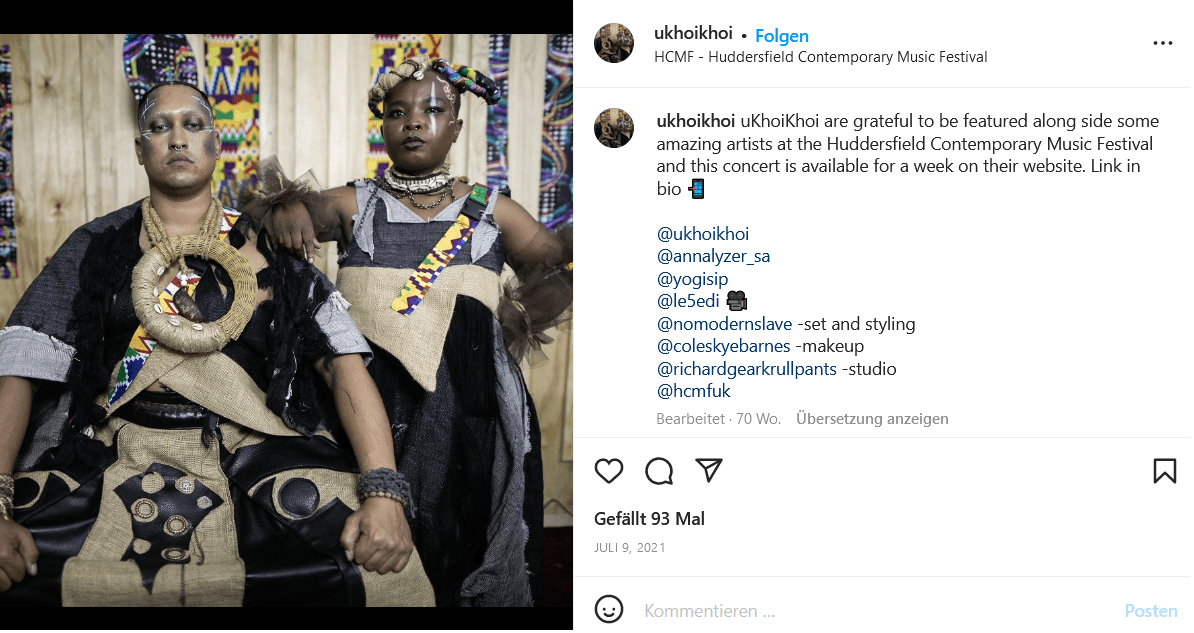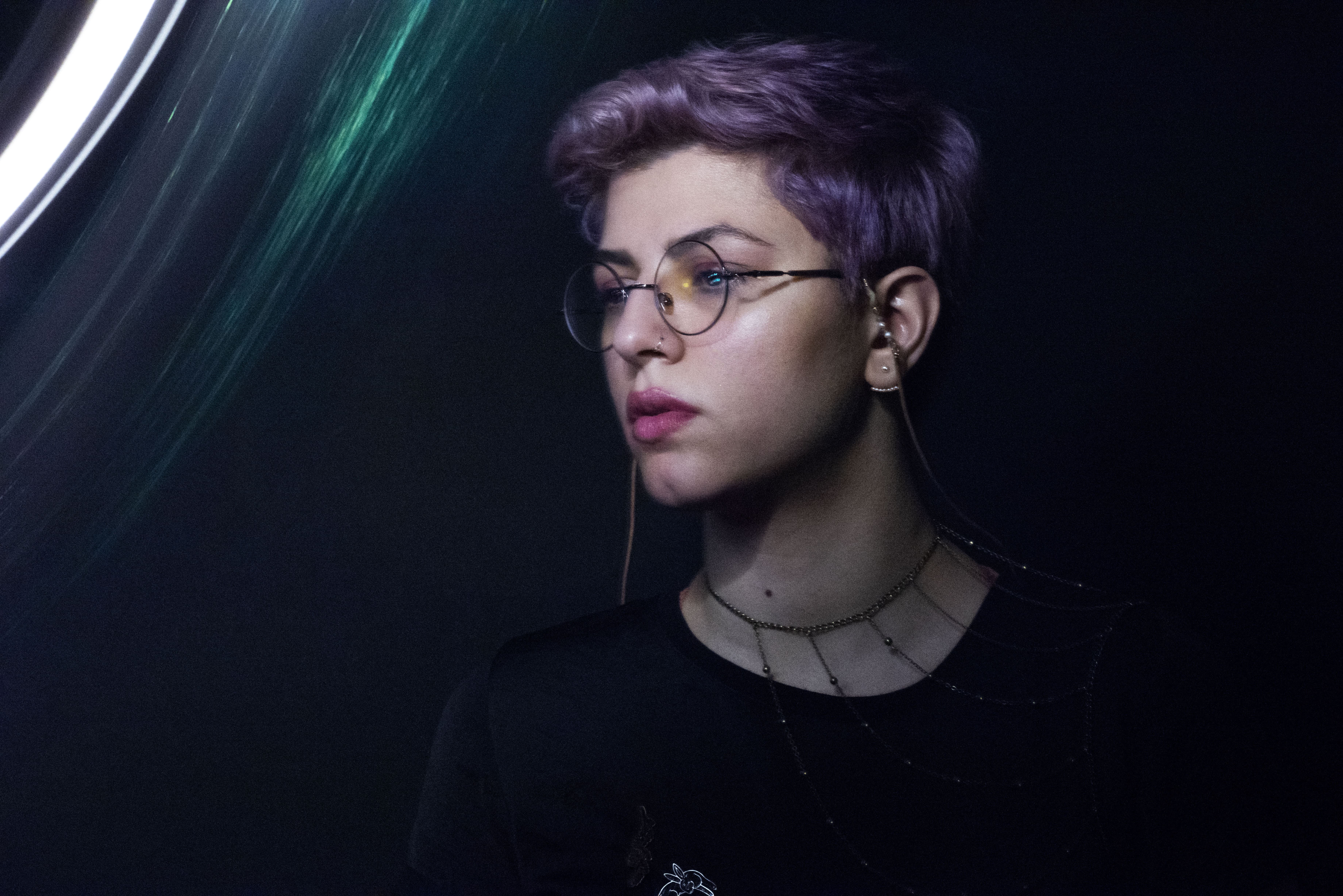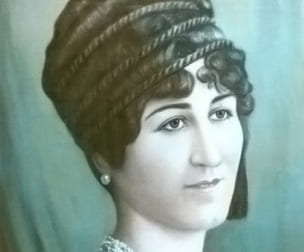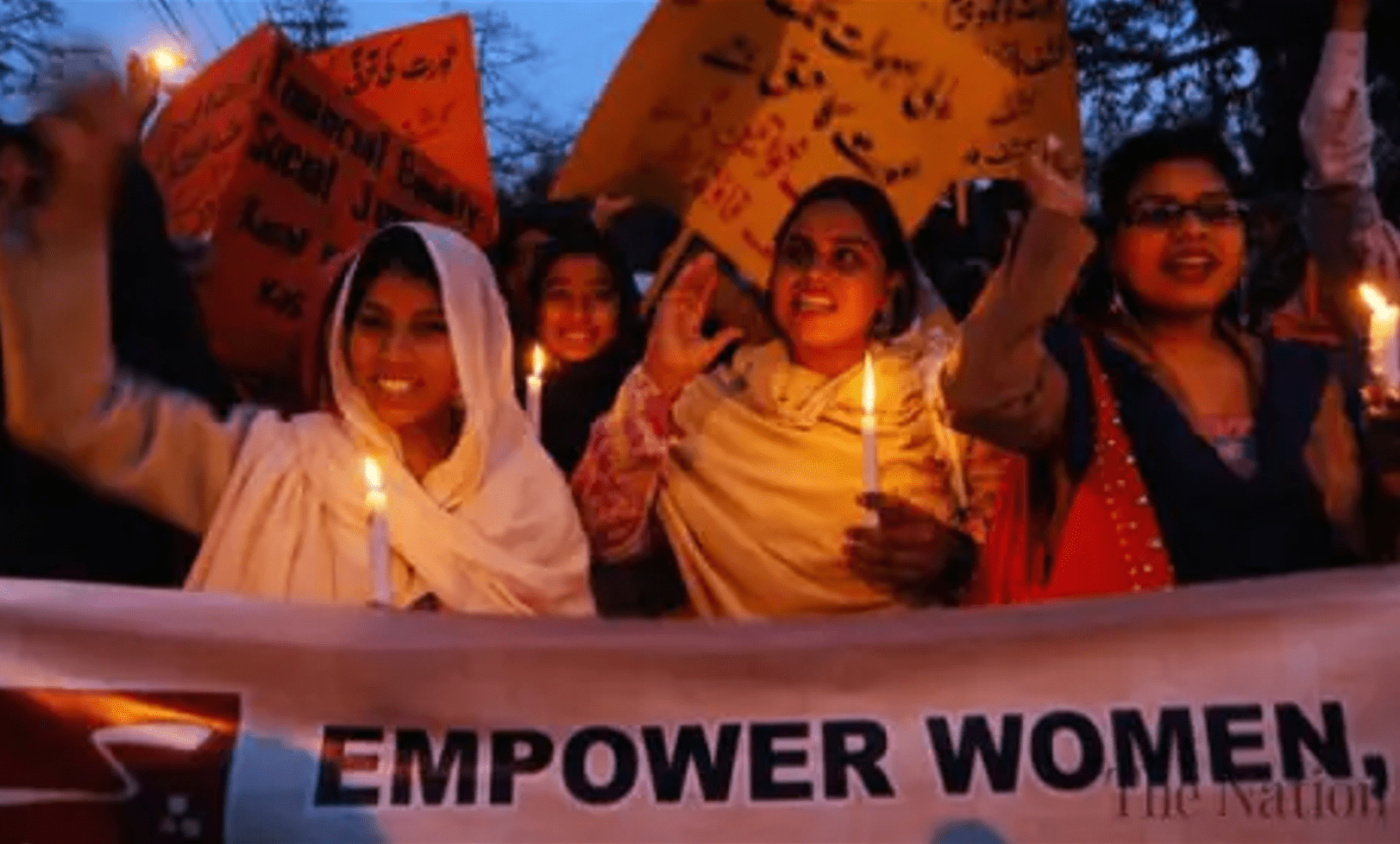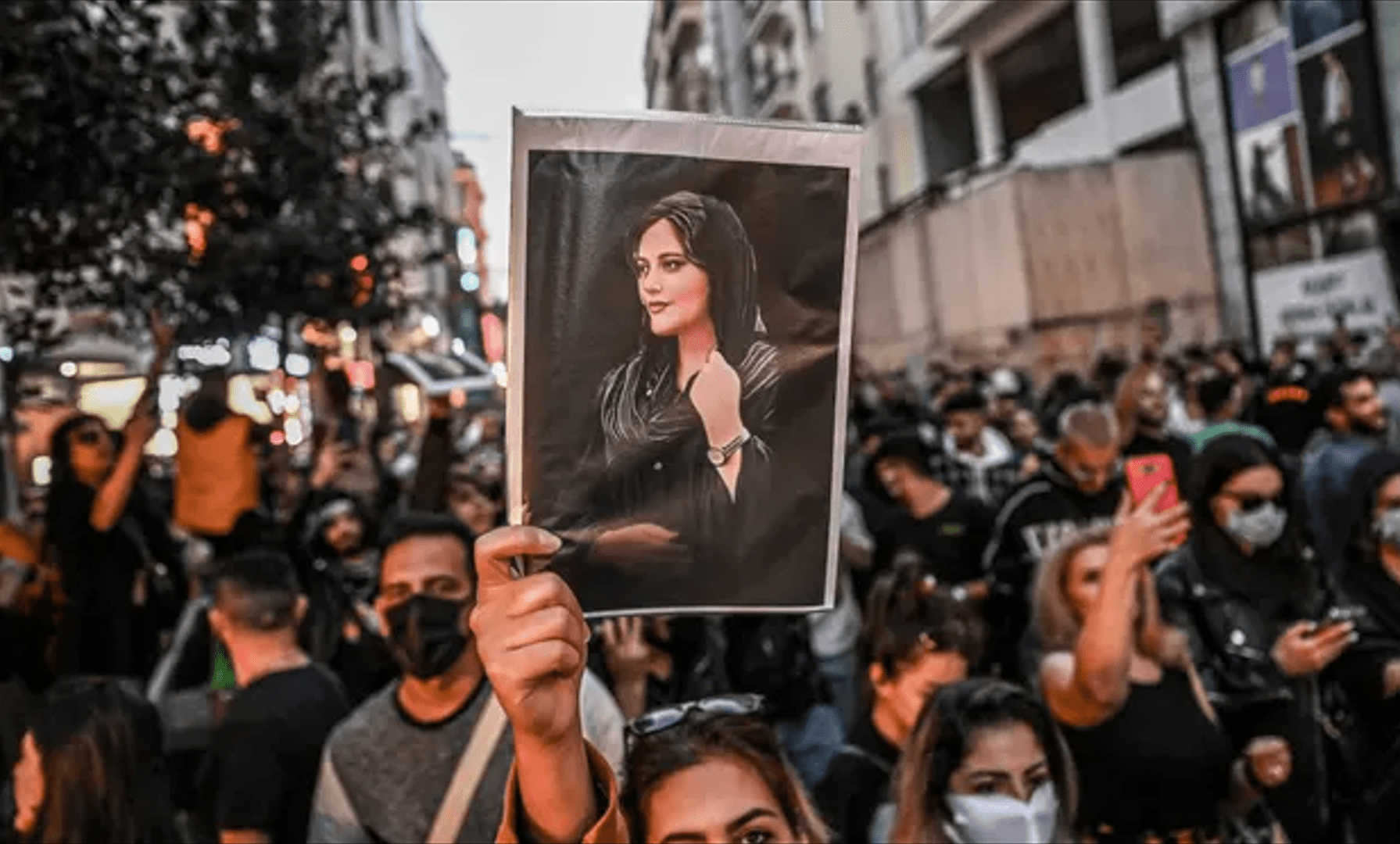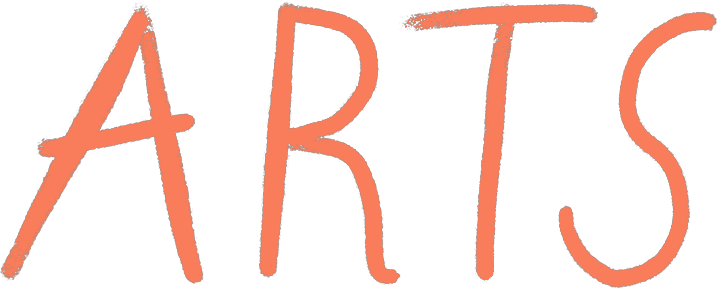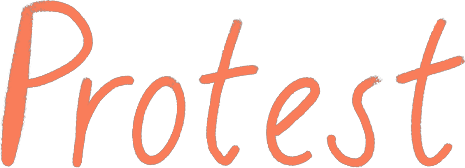
About Niki Tsironi
external link to Niki Tsironi on National Hellenic Research Foundation, Institute for Historical Research
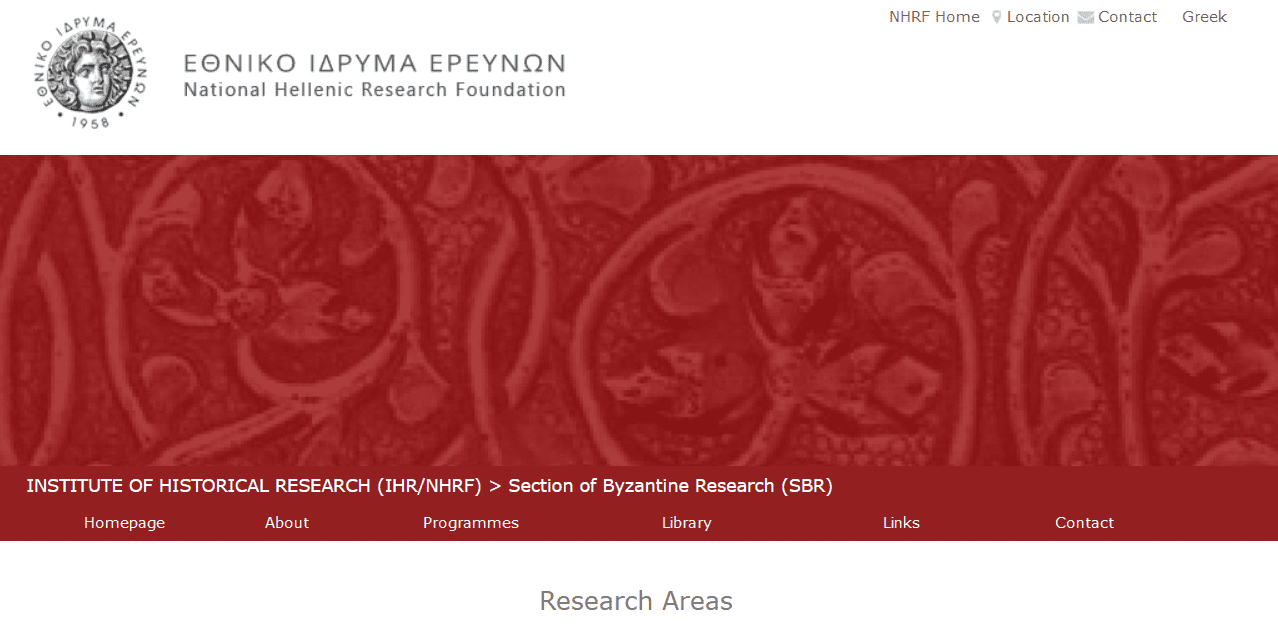
National Hellenic Research Foundation
external link to INSTITUTE OF HISTORICAL RESEARCH > Section of Byzantine Research
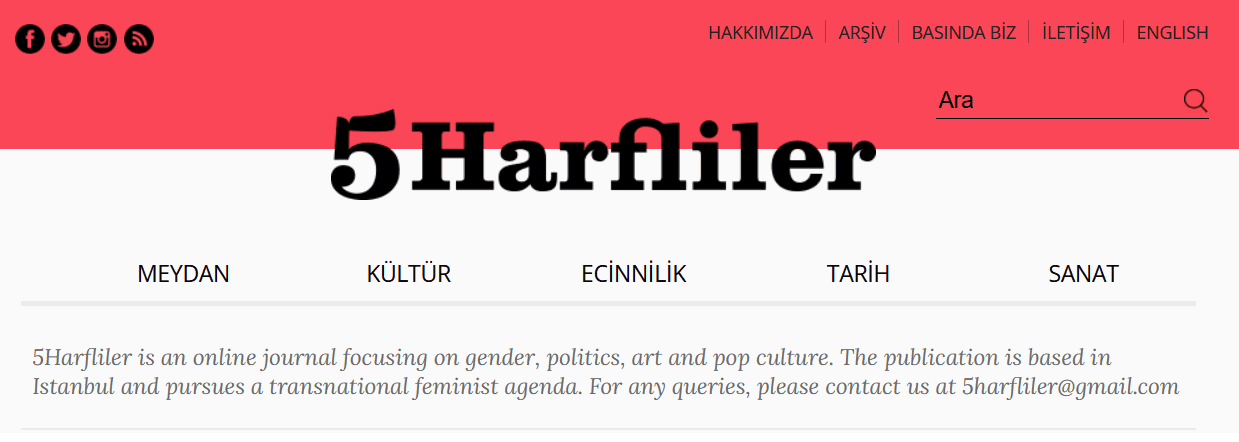
About 5Harfliler
about 5Harfliler 5Harfliler is an online journal focusing on gender, politics, art and pop culture. The publication is based in Istanbul and pursues a transnational feminist agenda.

About Havle
about Havle Havle Women’s Association was founded in Üsküdar in 2018, as “the first Muslim Feminist Women’s Association in Turkey”, with the aim of tackling the difficulties and obstacles that women, and especially Muslim women, face in every aspect of their lives.

About kainkollektiv
The internationally working artist team kainkollektiv has been working in various collaborations on theatrical scores between theater, installation and performance since 2008.
 Council of Europe.png)
Text of the Convention
Here you find the text of the Istanbul Convention to read on the website of the Council of Europe.
 European Disability Forum.jpg)
Text in easy language
On the website of the European Disability Forum you can find the text of the Istanbul Convention in easy language in English, French and German.
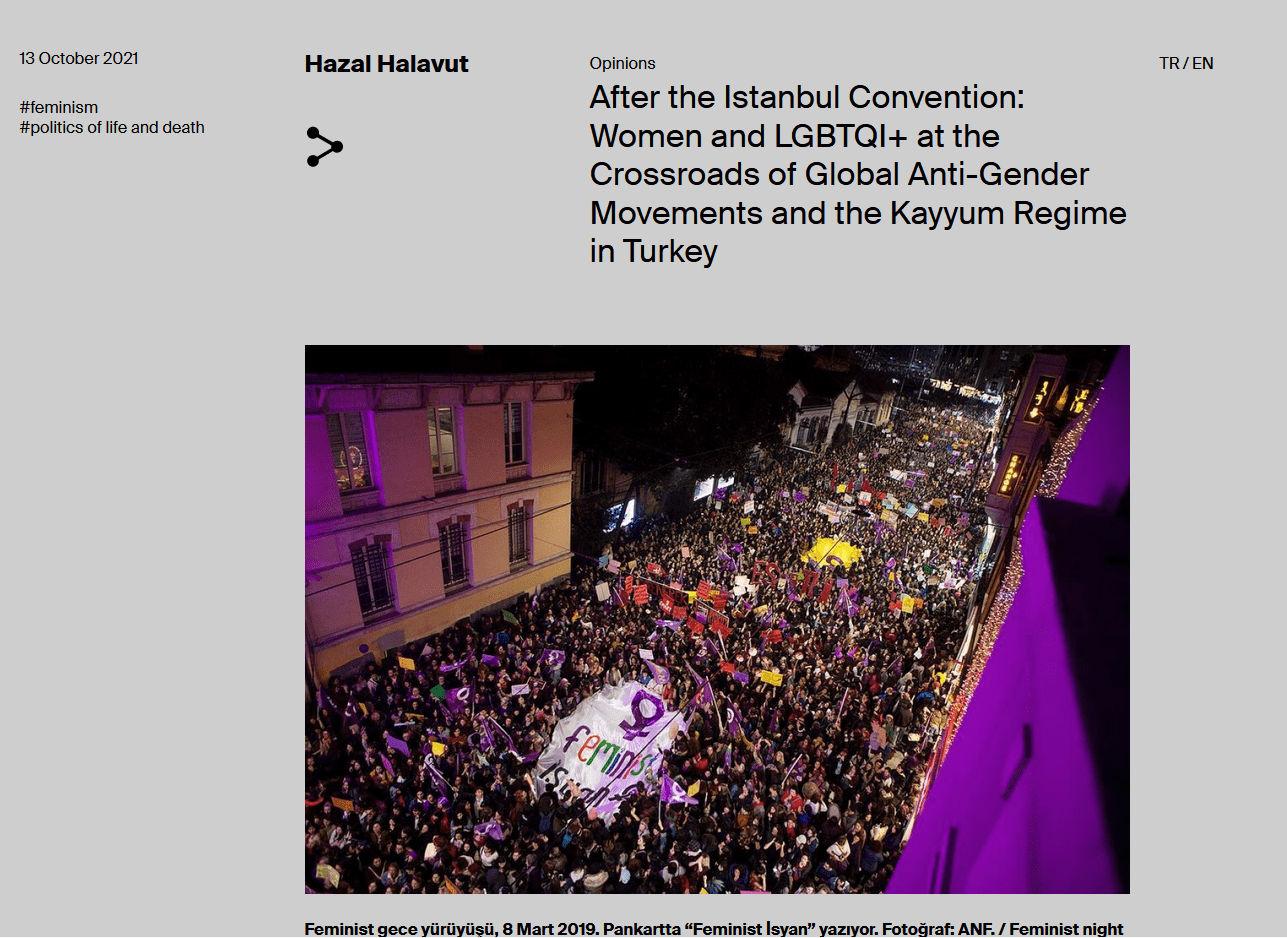
Article from Hazal Havalut about Istanbul Covention and Anti-Gender Movements in Turkey
L’Internationale Online, article written by Hazal Havalut: 'After the Istanbul Convention: Women and LGBTQI+ at the Crossroads of Global Anti-Gender Movements and the Kayyum Regime in Turkey'
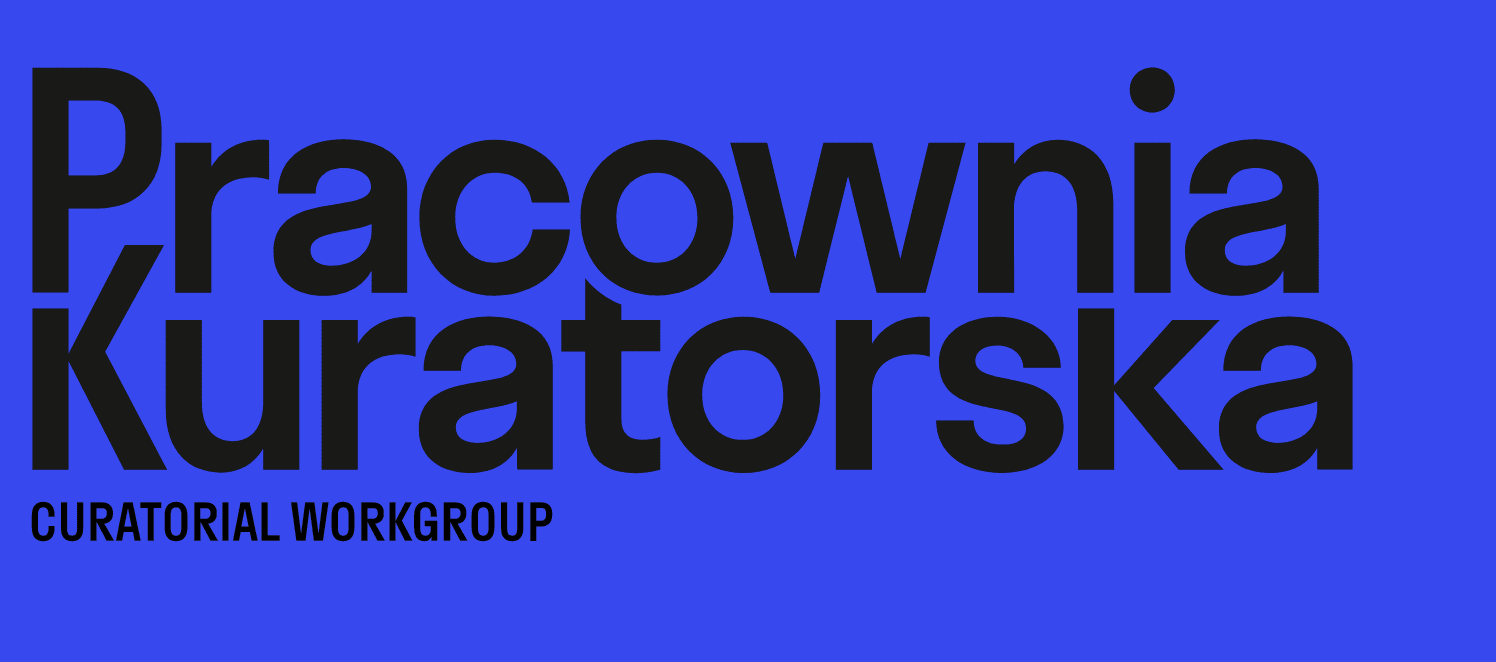
About Pracownia Kuratorska
The Curatorial Workshop was founded in 2018 on the initiative of people involved in theatre studies and cultural studies in Krakow. The impetus for its establishment was the desire to initiate culture-creating activities combining the humanities, sciences and art. The members of the group combine curatorial and production competences.
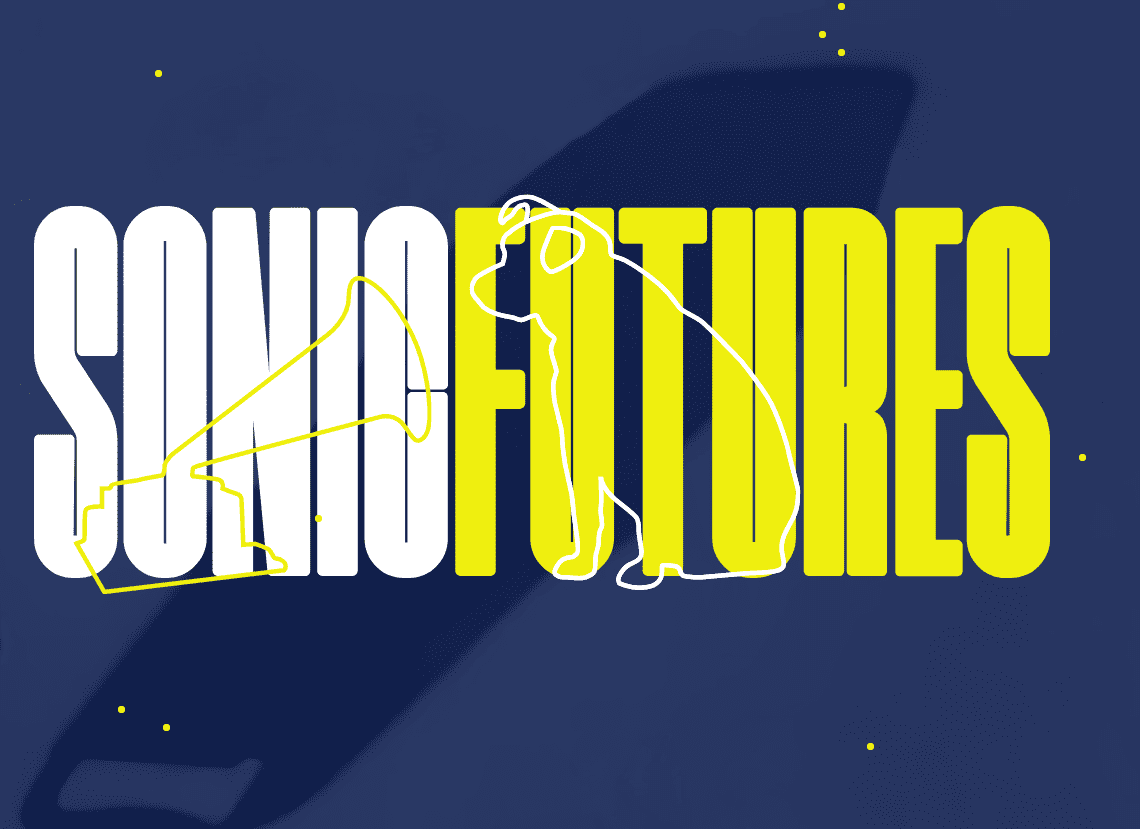
Archive of the artistic research project “Sonic Futures”
An archive of the artistic research project “Sonic Futures”: There you will find scripts, songs, stories, exercises, interviews and recordings of radio broadcasts. These archival materials were created in the course of research on scenarios of the future created in the context of the environmental crisis during which we were trying to formulate new artistic-research speculations.
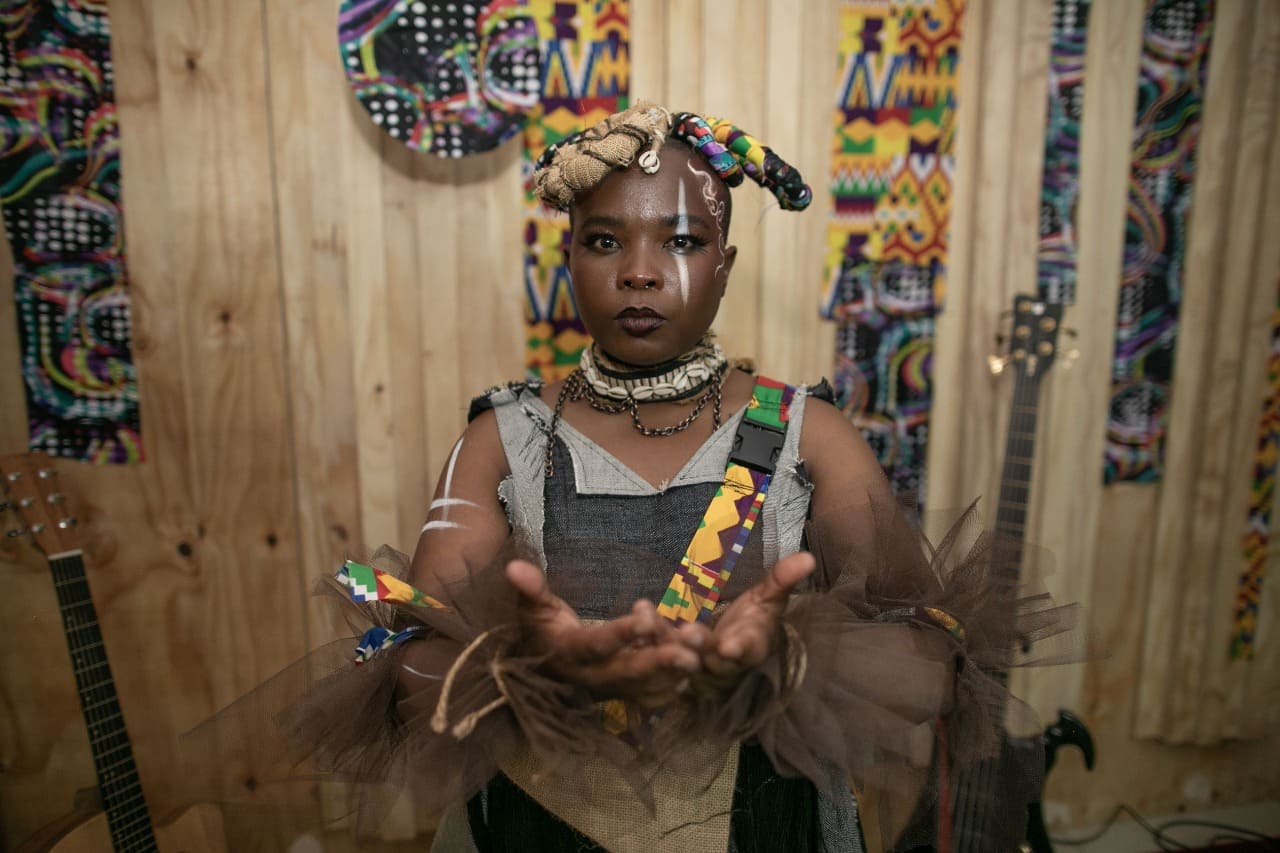
Annalyzer - Instagram account
External link to the Instagram account of ANNALYZER. You can find all the latest information on ANNALYZER'S current work there.
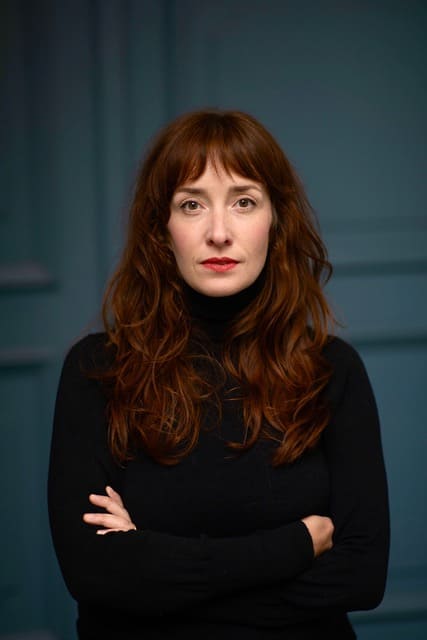
About Vanessa Chartrand-Rodrigue
External Link to the website of Vanessa Chartrand-Rodrigue, about her recent work and projects.
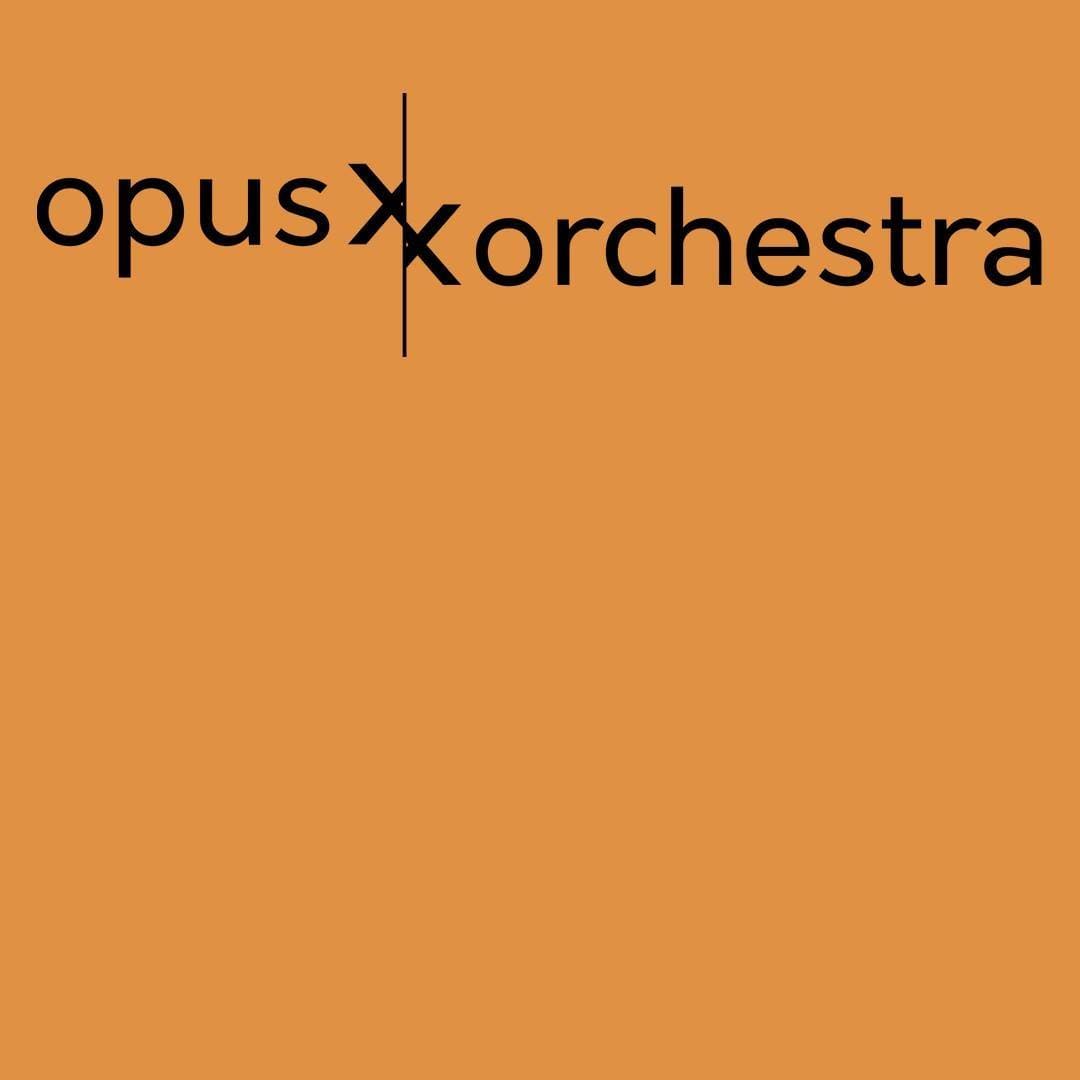
About OpusXX
The OpusXX Orchestra was created to give a voice to brilliant women composers across the centuries, to bring to life the many neglected treasures that have been forgotten by history, and to inspire the creation of further contemporary masterpieces by women composers.
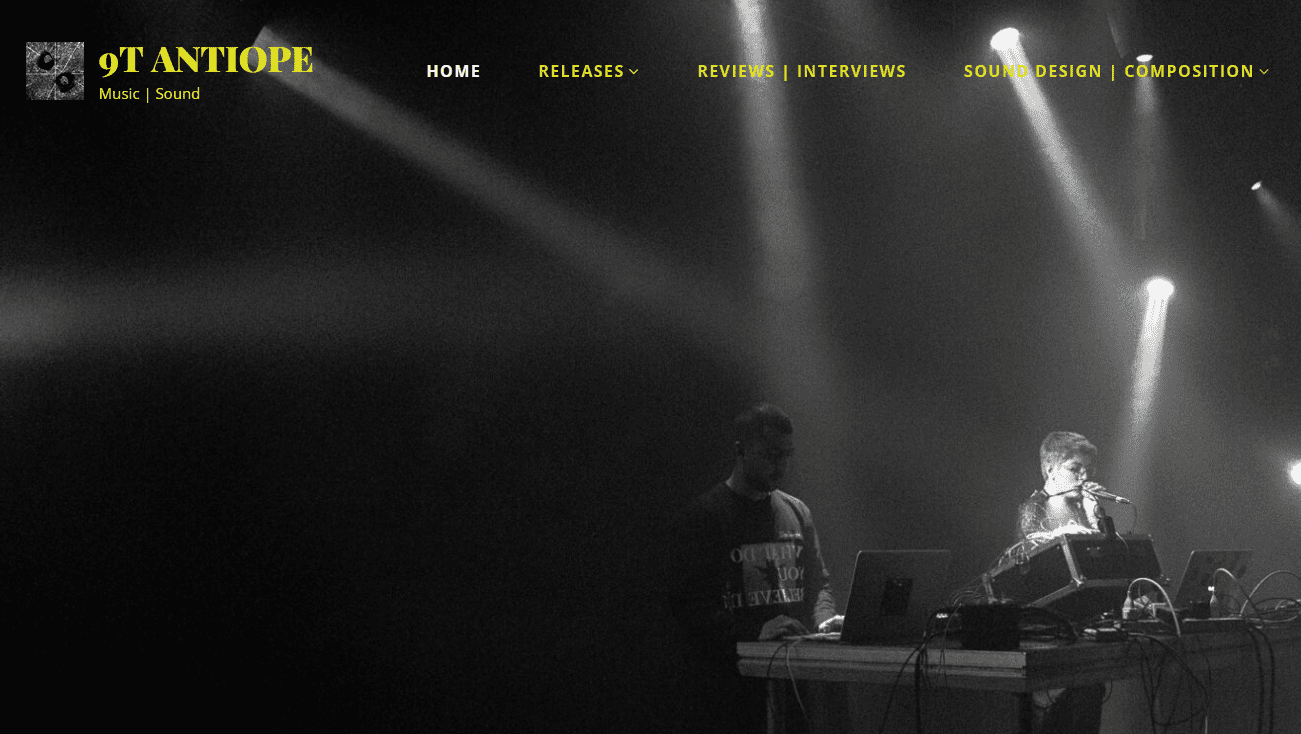
9T Antiope Website
External Link to the website of 9T Antiope The “9T Antiope” duo consists of Paris-based, Iranian musicians Nima Aghiani and Sara Bigdeli Shamloo [aka SarrSew]. The main focus of the band is on experimental music, using layers of acoustic instruments, electronics and combining them with vocals and lyrics, in order to narrate tiny bits or huge landscapes of the chaotic worlds they envision, along with their inhabitants.
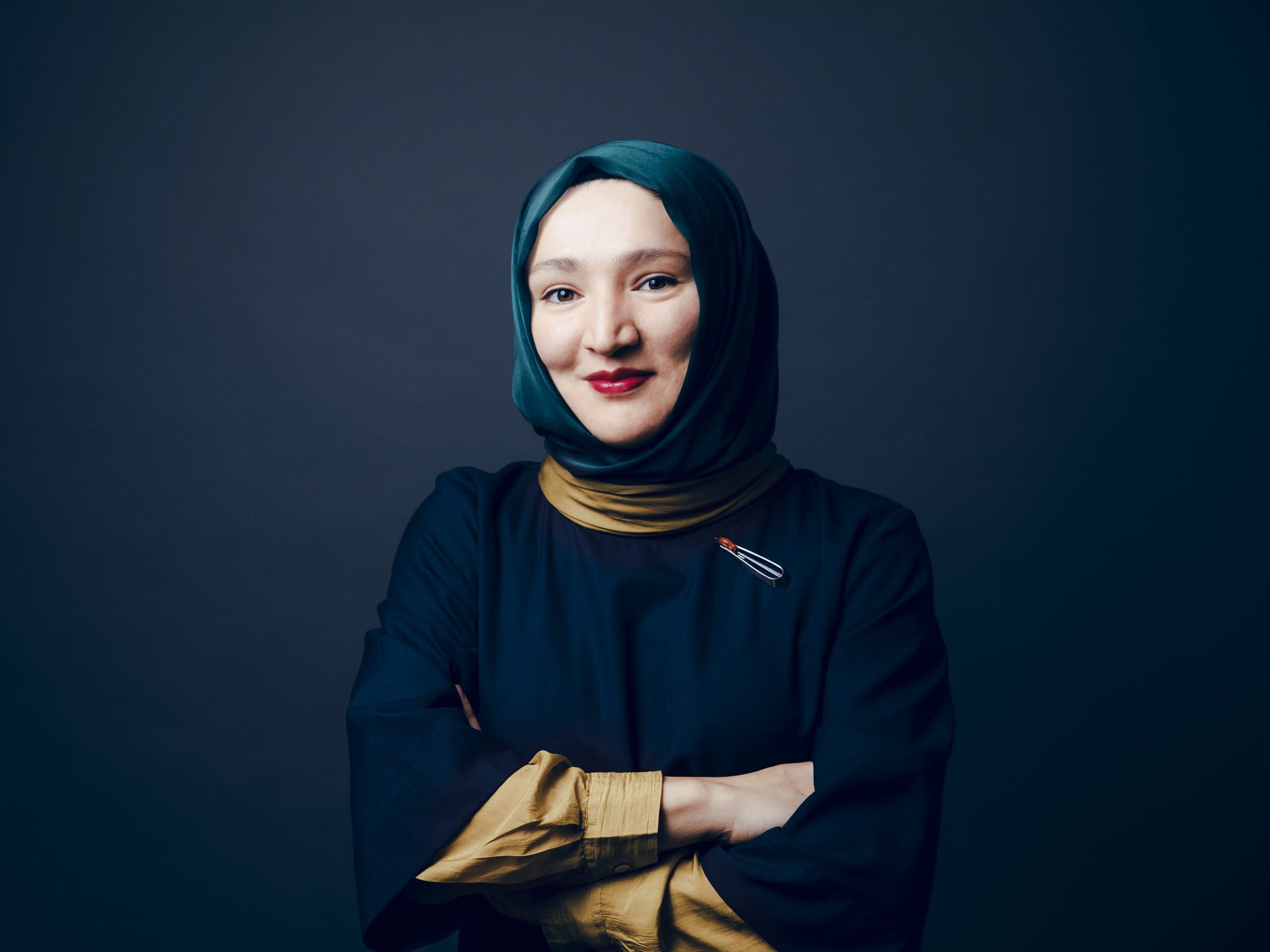
External link to the website from Kübra Gümüsay: Kübra Gümüsay is one of the most influential intellectuals and activists in Germany. Her work focuses on social justice and public discourse, and she is the founder of several award-winning campaigns against racism and sexualised violence.
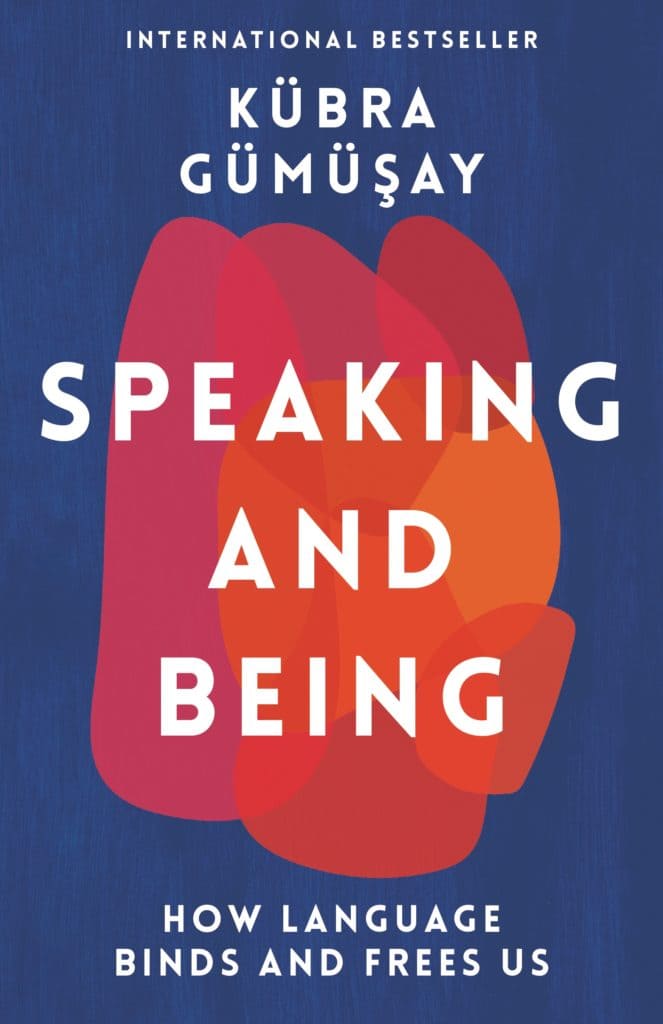
Here is the external link to Kübra Gümüsay's work 'Speaking and Being - How Language Binds and Frees Us' translated into English.

External link to Mithu M. Sanyal's website. Here you can find events with Mithu Sanyal, information about her books and publications.
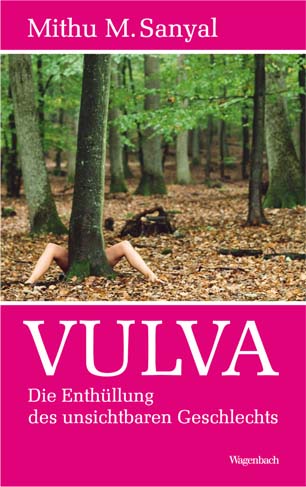
External link to Mithu M. Sanyla's book 'Vulva - The Unveiling of the Invisible Sex'. She describes her work as a small cultural history of the Occident - but based on the representation of the female genital in everyday life, folklore, medicine, mythology, literature and art.
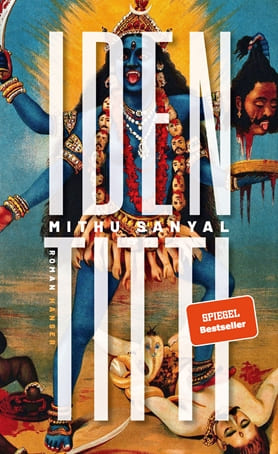
External link to 'Identtiti' by Mithu M. Sanyal, a novel about identity politics, fluid origins, culture war and the digital present.

External Link to the concert from ANNALYZER and ALIMA at tak Berlin, 2022. The concert took place as part of the 'SONGS OF CARE' concert series in cooperation with kainkollekitv and tak Theater Aufbau Kreuzberg Berlin
 Rosa Frank.jpg)
Soprano and actress Kerstin Pohle embodies a modern, multi-faceted type of performer who combines the worlds of music and theatre in a contemporary way. Trained as a classical opera singer, her focus is on contemporary performance and theatre. She works regularly with performance collectives such as kainkollektiv or sputnic and theatres such as Schauspiel Essen, Junges Theater Bremen, Schauspielhaus Bochum, Ringlokschuppen Mülheim or FFT Düsseldorf. She has also performed at festivals such as the Ruhrfestspiele Recklinghausen, Montpellier Danse and the Theatertreffen Berlin.
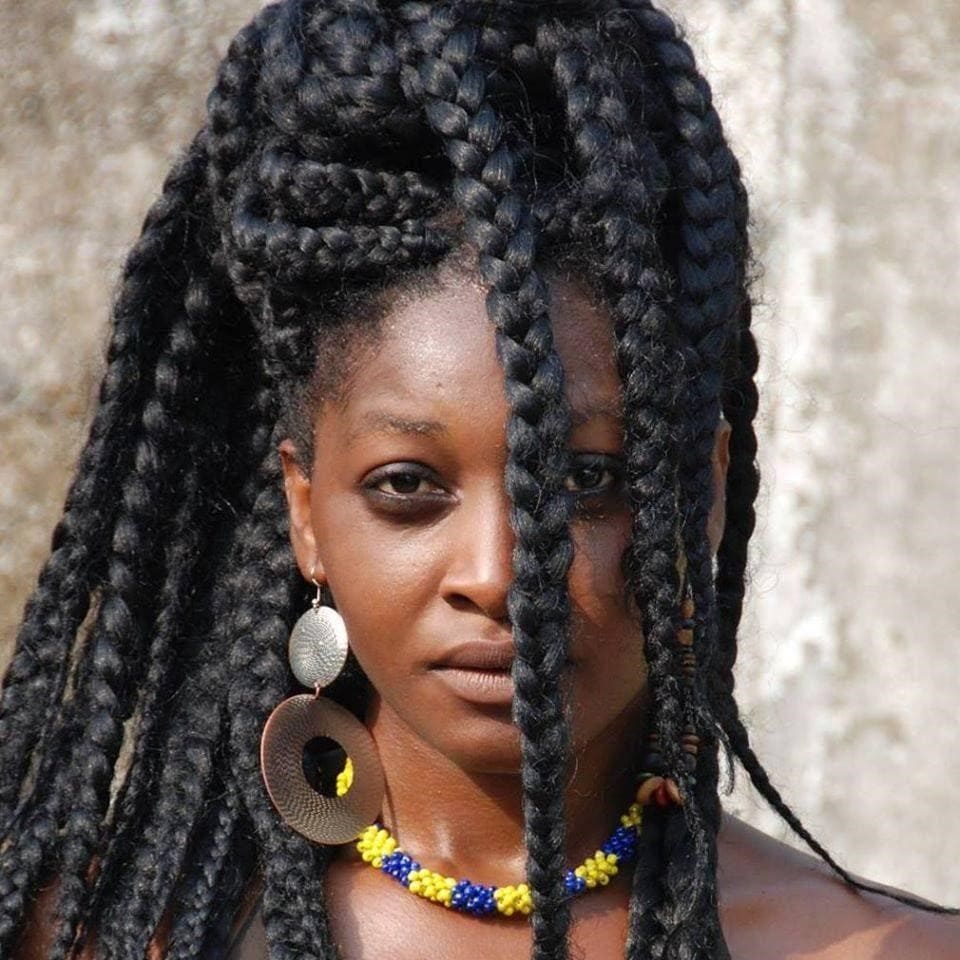
External link to ALIMA on SoundCloud Alima is a Cameroonian composer, lyricist and singer. She draws her inspiration from the important old and new Cameroonian figures: mantra, conspiracy and incantation, the essence of Fang-Beti music. Her music is influenced by the Mvett philosophy and music, which can be understood as a total art which combines music, dance, theatre and text.

Poet, Writer, Translator Ethiopia Christine Yohannes is an Ethiopian poet and writer and she describes herself “most of all a human being who is a strong believer in love”. A 2016 resident of the International Writing Program for international artists in Iowa, she is Ethiopia’s only female representative out of 5 since the program started in 1967. Christine has changed countries, continents, jobs, and appellations constantly. In her own words “fearless and adventurous, she has thrived in everything she has set her mind to with unshaken support of admirable African women”. She desires to do the same for the women around her and for future generations. Christine Yohannes writes about social change, performs at public events and conducts poetry workshops in schools. She has established a monthly event entitled “Poetic Saturdays” - a platform created to allow everyone the freedom of self-expression through art. Excerpt from the Conference Series Part 8: „Searching for Kassia – Protest Poems Yesterday and Today” – a (virtual) meeting with Chinese, Georgian, Russian, Ethiopian, Armenian, Kurdish, South Korean/Danish and Turkish women poets Host: Istanbul Gender Museum and kainkollektiv Moderation: Aylin Vartanyan

Poet Turkey Narîn Yukler was born in the Southeast of Turkey near Sanliurfa. She graduated from the Tourism and Hotel Management School of Gaziantep University and from the Faculty of Business Administration of Anadolu University. After graduation, she started to work as a hotel manager. She was involved in the activities of various non-governmental and human rights organizations, especially women’s rights organizations. In 2011, she was sued for supporting a press statement of Sanliurfa Human Rights Association. In 2014 she was sentenced to 10,5 years of imprisonment and that’s why she had to quit her work as hotel manager and flee to the city of Duhok in the Autonomous Kurdistan Region (Iraq) with her husband and her 40-day-old newborn. Many of her stories and poems written about Middle Eastern women, especially Kurdish, were published in newspapers and magazines in Iraq, Belgium, Pakistan, Iran, USA , Korea, India, Bulgaria, Dubai and Turkey. She has published two books with the titles Aynadaki Çürüme (in Turkish) and Rê û Rêç (in Kurdish). She has written theatrical plays on human and women’s rights, some of which were staged. She holds meetings in refugee camps where she reads her poems written in Kurdish and Turkish languages. Excerpt from the Conference Series Part 8: „Searching for Kassia – Protest Poems Yesterday and Today” – a (virtual) meeting with Chinese, Georgian, Russian, Ethiopian, Armenian, Kurdish, South Korean/Danish and Turkish women poets Host: Istanbul Gender Museum and kainkollektiv Moderation: Aylin Vartanyan

Poet, human rights activist, essayist, journalist Hong Kong Tang Siu Wa is a poet, writer, cultural critic, essayist, journalist, and curator based in Hong Kong. She is the author of poetry collections, volumes of prose writing, and a collection of interviews. She is one of the founding editors of the literary magazine Fleurs des Lettres, and now acts as chief editor of several Hong Kong literature magazines. Tang is currently Chief Curator of the House of Hong Kong Literature and the conveyor of the House’s board. Tang’s recent curatorial work focuses on creating cross-disciplinary dialogue between literature and other artistic disciplines. As literary organizer and human rights activist she teaches creative writing at various Hong Kong institutions and contributes columns and criticism to a variety of local media. Tang has acted as a human rights activist for more than 10 years, she was accused of riot in 2019 (charge dropped already) and hit by a teargas bullet just beside her left eye in 2020. Siu Wa wrote her poem on a day when she thought about empathizing with the pain of people we don't know after seeing demonstrators attacked by police during a demonstration. Excerpt from the Conference Series Part 8: „Searching for Kassia – Protest Poems Yesterday and Today” – a (virtual) meeting with Chinese, Georgian, Russian, Ethiopian, Armenian, Kurdish, South Korean/Danish and Turkish women poets Host: Istanbul Gender Museum and kainkollektiv Moderation: Aylin Vartanyan

Poet, editor Istanbul Karin Karakaşlı, born in Istanbul, is a poet, writer, journalist and a human rights activist. For many years she has worked for the well-known Turkish-Armenian weekly newspaper Agos, which plays a very important role in the printed press in Turkey. She has published numerous short stories, novels, poems, children’s books, youth novels, and essays. She is also co-author of the study “Armenians in Turkey: Community, Individual, Citizen”. Excerpt from the Conference Series Part 8: „Searching for Kassia – Protest Poems Yesterday and Today” – a (virtual) meeting with Chinese, Georgian, Russian, Ethiopian, Armenian, Kurdish, South Korean/Danish and Turkish women poets Host: Istanbul Gender Museum and kainkollektiv Moderation: Aylin Vartanyan

Presented by: Anthi Karra Crete Born in 1955 and raised in Iraklion (Crete), in a refugee family originated from the Smyrna region of Anatolia, she studied law and slavistics in Paris, specialized in International Public Law. But… she worked for 35 years as a linguist in the Greek Translation Section of the Council of the European Union in Brussels. Passionate about the history and the culture of the late ottoman world, she translated the last 30 years numerous Turkish literary texts to Greek, and has dedicated herself, since her retirement, to the study of the cultural contacts existing between these two languages, especially the last 100 years of their « national » existence. Translated by: Lee Cockshott studied Contemporary Performance Practice at the Royal Conservatoire of Scotland and has since been involved in numerous artistic and social projects, including the realization of a Chinese-English bilingual theater piece at the Edinburgh Fringe Festival, a music therapy project in Croatia for war traumatized people, and for the past three years with the association 'Trimum', whose goal is to build bridges between generations, cultures and religious communities through the common language of music. Her artistic focus is on singing, spoken word performance and using the arts to connect people who would otherwise have nothing to do with each other. She hopes to continue to support valuable and exciting dialogues with her craft. Excerpt from the Conference Series Part 8: „Searching for Kassia – Protest Poems Yesterday and Today” – a (virtual) meeting with Chinese, Georgian, Russian, Ethiopian, Armenian, Kurdish, South Korean/Danish and Turkish women poets Host: Istanbul Gender Museum and kainkollektiv Moderation: Aylin Vartanyan

Poet, filmmaker, performance artist Tuğçe Aydın is a filmmaker and performance artist. She completed her B.Sc. in Biology at the Middle East Technical University. She got a master’s degree in Cinema Television from Kadir Has University. She has been creatively inspired by documentary filmmaking and performance art where she questions notions of encounters, experience in art & life, empathy & harmony between people, cultures and their stories. Excerpt from the Conference Series Part 8: „Searching for Kassia – Protest Poems Yesterday and Today” – a (virtual) meeting with Chinese, Georgian, Russian, Ethiopian, Armenian, Kurdish, South Korean/Danish and Turkish women poets Host: Istanbul Gender Museum and kainkollektiv Moderation: Aylin Vartanyan

Poet, researcher on transnational adoption system, nationalism and racism South Korea/Denmark. Maja Lee Langvad was born 1980 in South Korea, and grew up in Copenhagen, Denmark. She is a writer and translator. Her books explore themes such as transnational adoption, national identity, racism, kinship, food, illness and the act of writing. Maja has been an influential voice in debates on transnational adoption. In her book She is Angry Langvad’s subjective history is broadened and the trauma she experienced on her own skin – literally, as eczema – is put into the context of the transnational adoption system, which the poet has also criticized in debates. She has translated Fragebogen (Questionnaires) by the Swiss author Max Frisch into Danish. Together with her colleague Kristina Nya Glaffey she has translated Baby Precious Always Shines by the American author Gertrude Stein and her partner Alice B. Toklas. She is the co-editor of the Nordic literary journal Kritiker. Excerpt from the Conference Series Part 8: „Searching for Kassia – Protest Poems Yesterday and Today” – a (virtual) meeting with Chinese, Georgian, Russian, Ethiopian, Armenian, Kurdish, South Korean/Danish and Turkish women poets Host: Istanbul Gender Museum and kainkollektiv Moderation: Aylin Vartanyan

Poet, feminist activist, associate professor at the Department of Russian as a foreign language at UrFU, Philology Yekaterinburg Egana Dzhabbarova lives in Yekaterinburg, she is a poet who has published numerous poetry books. She publishes in printed and online magazines in Russia and Ukraine. Her poems have been translated into English, Polish and Italian and published in several international anthologies. Egana is particularly interested in topics such as decolonial writing. She won New Youth magazine's Poetic Debut Award in 2016. At the moment she is an associate professor at the Ural State University, Department of Russian as a foreign language. Egana Dzhabbarova wrote this poem written for three sisters – the Kachaturian sisters - who received a prison sentence for killing their father who had abused them sexually since their childhood. Excerpt from the Conference Series Part 8: „Searching for Kassia – Protest Poems Yesterday and Today” – a (virtual) meeting with Chinese, Georgian, Russian, Ethiopian, Armenian, Kurdish, South Korean/Danish and Turkish women poets Host: Istanbul Gender Museum and kainkollektiv Moderation: Aylin Vartanyan

Gender non-conforming writer, performer, mixed-media artist Alok Vaid Menon is an internationally acclaimed gender non-conforming writer, performer and public speaker. As a mixed-media artist Alok uses poetry, comedy, sound-art, fashion design to explore themes of gender, race, trauma, belonging and the human condition. Their artistry responds to violence against trans and gender non-conforming people, calling for freedom from constraining gender norms. They advocate for bodily diversity, gender neutrality, and self-determination. Alok attended Stanford University where they graduated with a BA in feminist, gender, and sexuality studies and comparative studies in race and ethnicity, as well as a masters in sociology in 2013. Excerpt from the Conference Series Part 8: „Searching for Kassia – Protest Poems Yesterday and Today” – a (virtual) meeting with Chinese, Georgian, Russian, Ethiopian, Armenian, Kurdish, South Korean/Danish and Turkish women poets Host: Istanbul Gender Museum and kainkollektiv Moderation: Aylin Vartanyan
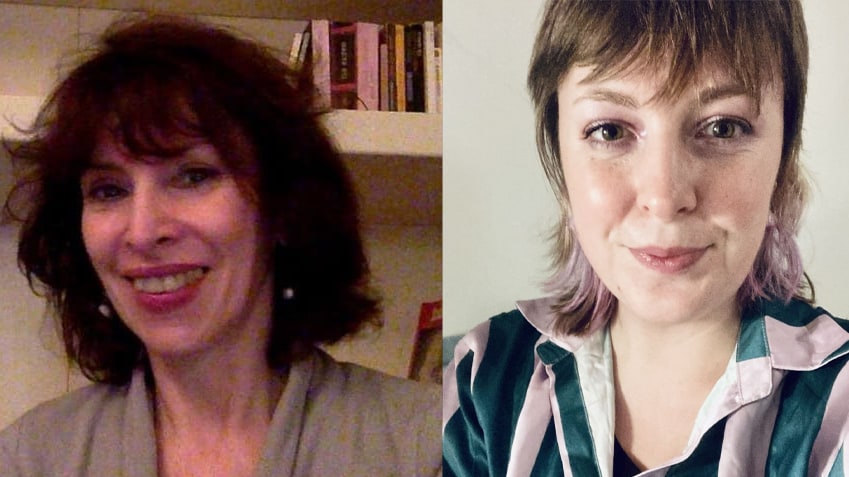
Presented by: Anthi Karra Crete Born in 1955 and raised in Iraklion (Crete), in a refugee family originated from the Smyrna region of Anatolia, she studied law and slavistics in Paris, specialized in International Public Law. But… she worked for 35 years as a linguist in the Greek Translation Section of the Council of the European Union in Brussels. Passionate about the history and the culture of the late ottoman world, she translated the last 30 years numerous Turkish literary texts to Greek, and has dedicated herself, since her retirement, to the study of the cultural contacts existing between these two languages, especially the last 100 years of their « national » existence. Translated by: Lee Cockshott studied Contemporary Performance Practice at the Royal Conservatoire of Scotland and has since been involved in numerous artistic and social projects, including the realization of a Chinese-English bilingual theater piece at the Edinburgh Fringe Festival, a music therapy project in Croatia for war traumatized people, and for the past three years with the association 'Trimum', whose goal is to build bridges between generations, cultures and religious communities through the common language of music. Her artistic focus is on singing, spoken word performance and using the arts to connect people who would otherwise have nothing to do with each other. She hopes to continue to support valuable and exciting dialogues with her craft. Excerpt from the Conference Series Part 8: „Searching for Kassia – Protest Poems Yesterday and Today” – a (virtual) meeting with Chinese, Georgian, Russian, Ethiopian, Armenian, Kurdish, South Korean/Danish and Turkish women poets Host: Istanbul Gender Museum and kainkollektiv Moderation: Aylin Vartanyan
Here you can find the complete recording of the Online Conference Series Part 6 with the title: Kassia Revisited, Researchers on Kassia’s poems and music Speakers: Alice-Mary M. Talbot, Liz James, Niki Tsironi, Barbara Harbach, Cecily Hennessy, Katia Savrami, Alexander Lingas, Thomas Arenzten, Kurt Sherry Moderation: Meral Akkent & Milan Vukašinović hosted by: Gender Museum Istanbul (Meral Akkent) October 2021
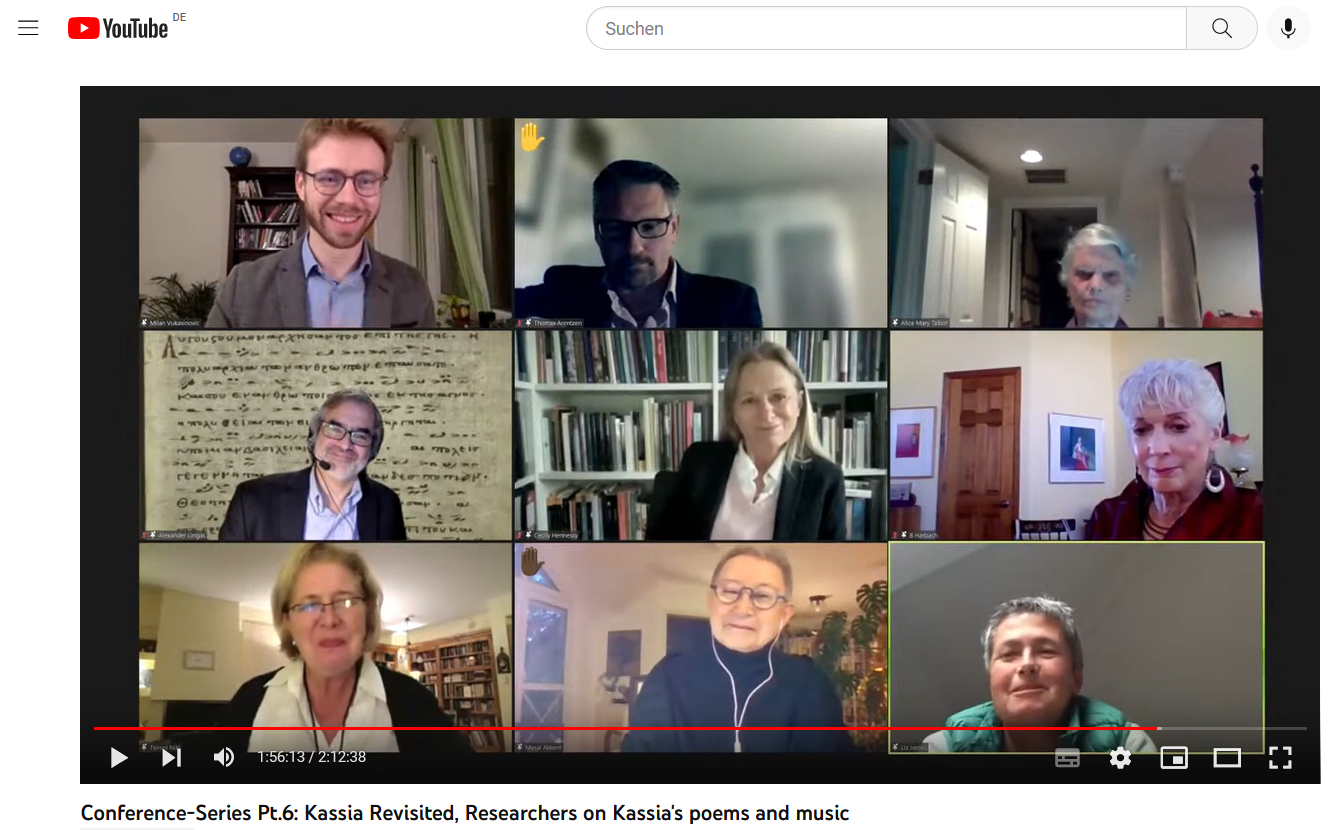
TRANSLATION IN TURKISH Here you can find the complete recording of the Online Conference Series Part 6 with the title: Kassia Revisited, Researchers on Kassia’s poems and music Speakers: Alice-Mary M. Talbot, Liz James, Niki Tsironi, Barbara Harbach, Cecily Hennessy, Katia Savrami, Alexander Lingas, Thomas Arenzten, Kurt Sherry Moderation: Meral Akkent & Milan Vukašinović hosted by: Gender Museum Istanbul (Meral Akkent) October 2021
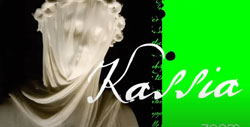
Here you can find the complete recording of the Online Conference Series Part 4 with the title: IMAGINING KASSIA’S NEW ISTANBUL CONVENTION Speakers: Rümeysa Çamdereli, Suna Kafadar, Hazal Havalut, Burcu Kalpaklıoğlu, Anna Majewska, Zuzanna Berendt Moderation: Mirjam Schmuck & Fabian Lettow (kainkollektiv) hosted by: kainkollektiv October 2021
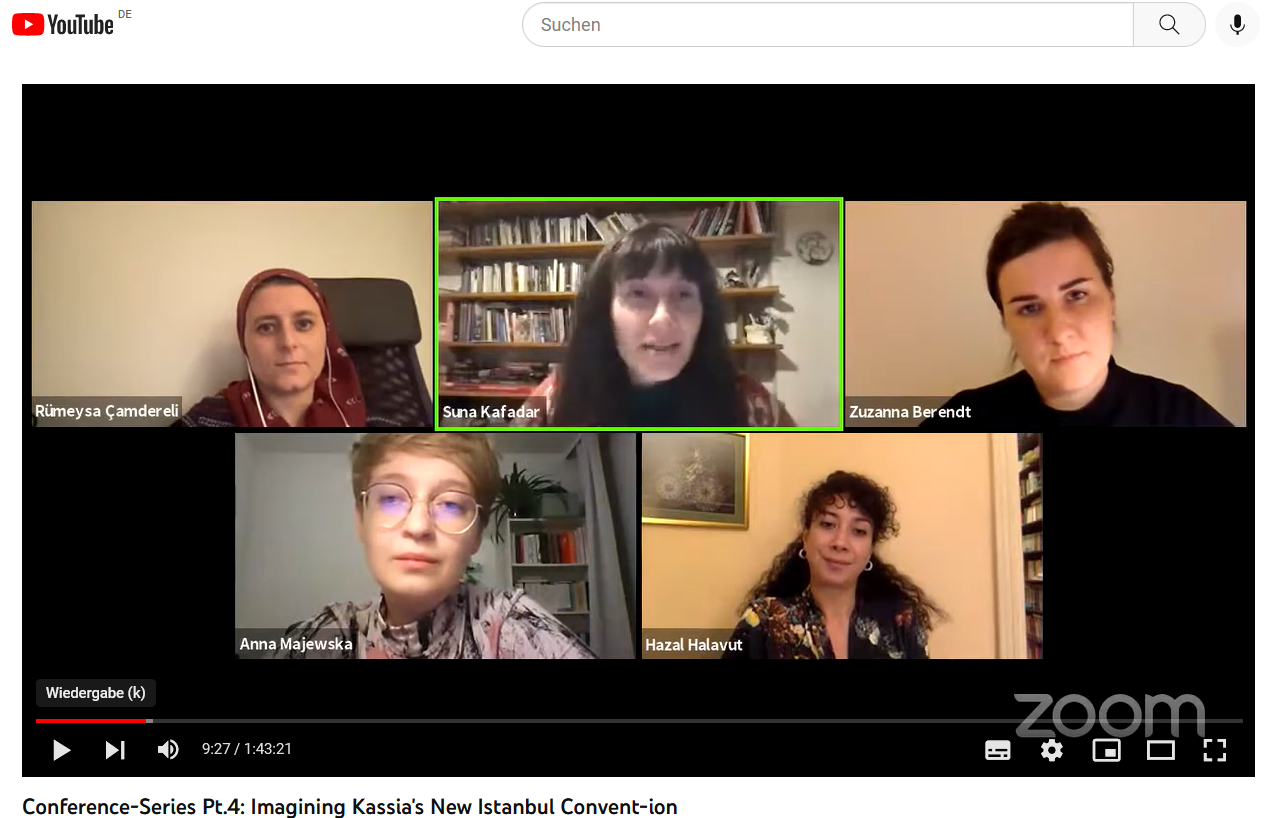
TRANSLATION IN POLISH Here you can find the complete recording of the Online Conference Series Part 4 with the title: IMAGINING KASSIA’S NEW ISTANBUL CONVENTION Speakers: Rümeysa Çamdereli, Suna Kafadar, Hazal Havalut, Burcu Kalpaklıoğlu, Anna Majewska, Zuzanna Berendt Moderation: Mirjam Schmuck & Fabian Lettow (kainkollektiv) hosted by: kainkollektiv October 2021
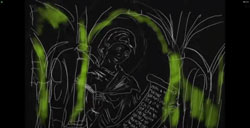
TRANSLATION IN ENGLISH: Here you can find the complete recording of the Online Conference Series Part 2 with the title: FEMINIST WORK. THINKING THROUGH METHODS, FIELDS AND CONDITIONS Speakers: Katarzyna Żeglicka, Dominika Bremer, Agnieszka Różyńska, Agata Siniarska, Anna Pekaniec, Pauline Kramarz Moderation: Anna Majewska, Zuzanna Berendt hosted by: Pracownia Kuratorska September 2021
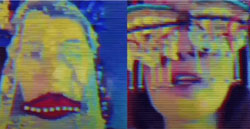
Here you can find the complete recording of the Online Conference Series Part 2 with the title: FEMINIST WORK. THINKING THROUGH METHODS, FIELDS AND CONDITIONS Speakers: Katarzyna Żeglicka, Dominika Bremer, Agnieszka Różyńska, Agata Siniarska, Anna Pekaniec, Pauline Kramarz Moderation: Anna Majewska, Zuzanna Berendt Moderation: Anna Majewska, Zuzanna Berendt hosted by: Pracownia Kuratorska Semptember 2021
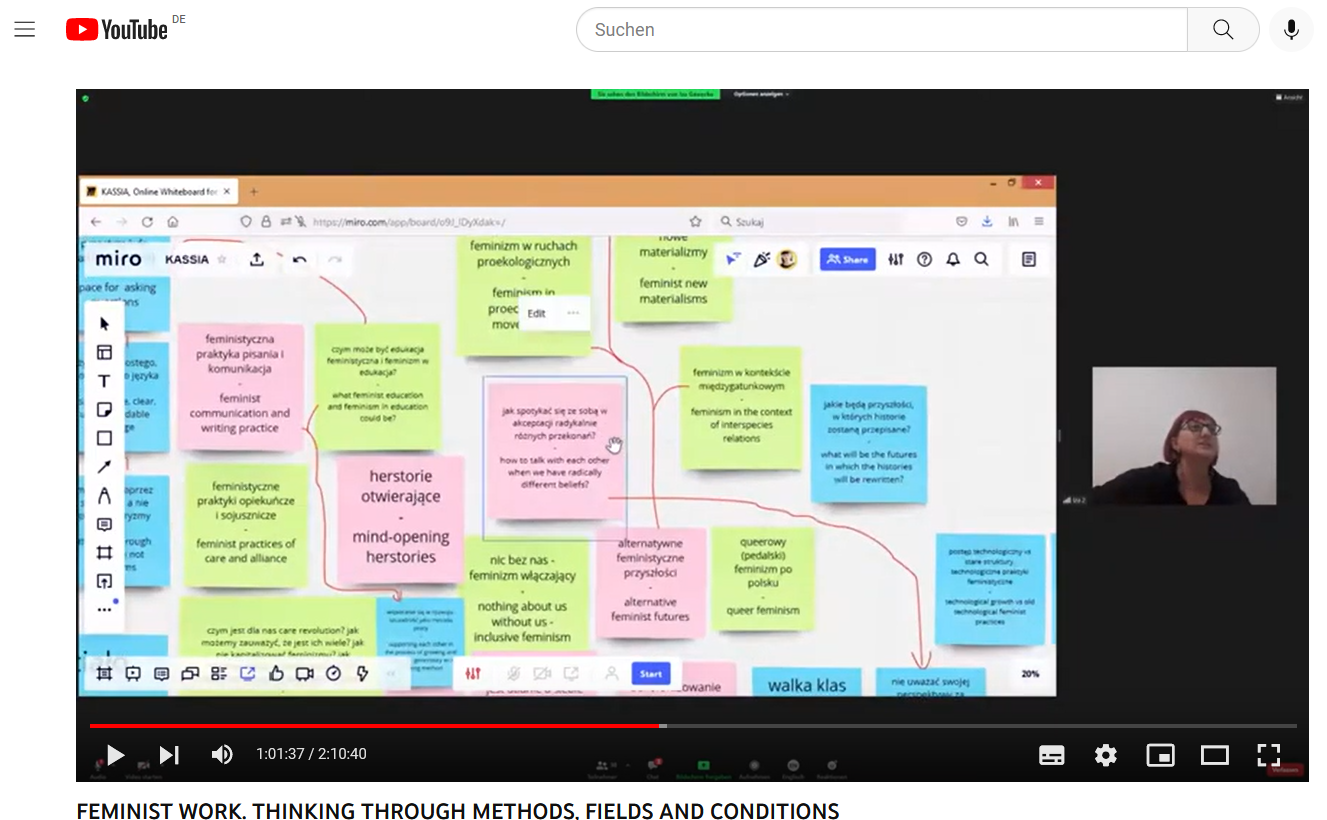
TRANSLATION IN TURKISH Here you can find the complete recording of the Online Conference Series Part 2 with the title: FEMINIST WORK. THINKING THROUGH METHODS, FIELDS AND CONDITIONS Speakers: Katarzyna Żeglicka, Dominika Bremer, Agnieszka Różyńska, Agata Siniarska, Anna Pekaniec, Pauline Kramarz Moderation: Anna Majewska, Zuzanna Berendt Moderation: Anna Majewska, Zuzanna Berendt hosted by: Pracownia Kuratorska Semptember 2021
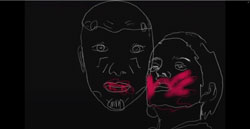
Here you can find the complete recording of the Online Conference Series Part 1 with the title: KASSIA AND THE FALLEN WOMEN. AS OVERTURE OF THE CONFERENCE SERIES Speakers: Sara Bigdeli Shamloo, Anelisa Stuurman, Vanessa Chartrand-Rodrigue Moderation: Mirjam Schmuck & Fabian Lettow (kainkollektiv) hosted by: kainkollektiv October 2021
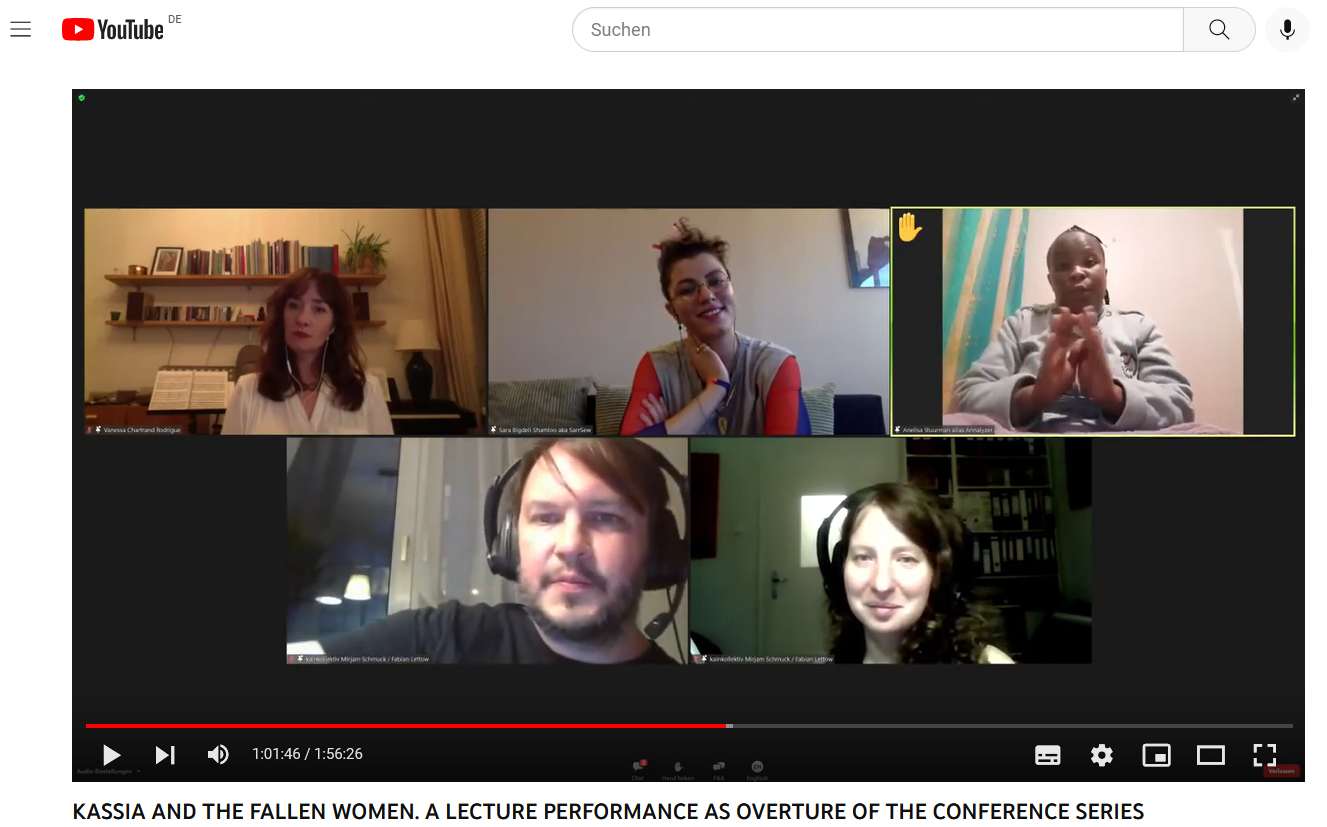
TRANSLATION IN POLISH: Here you can find the complete recording of the Online Conference Series Part 1 with the title: KASSIA AND THE FALLEN WOMEN. AS OVERTURE OF THE CONFERENCE SERIES Speakers: Sara Bigdeli Shamloo, Anelisa Stuurman, Vanessa Chartrand-Rodrigue Moderation: Mirjam Schmuck & Fabian Lettow (kainkollektiv) hosted by: kainkollektiv October 2021
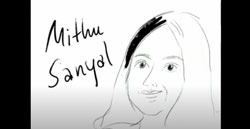
Here you can find the complete recording of the Online Conference Series Part 5 with the title: ON SPEAKING & BEING. FEMALE SPACES OF LANGUAGE Speakers: Mithu Sanyal, Kübra Gümüşay Moderation: Mirjam Schmuck (kainkollektiv) & Lydia Ziemke (suite42) hosted by: kainkollektiv September 2021
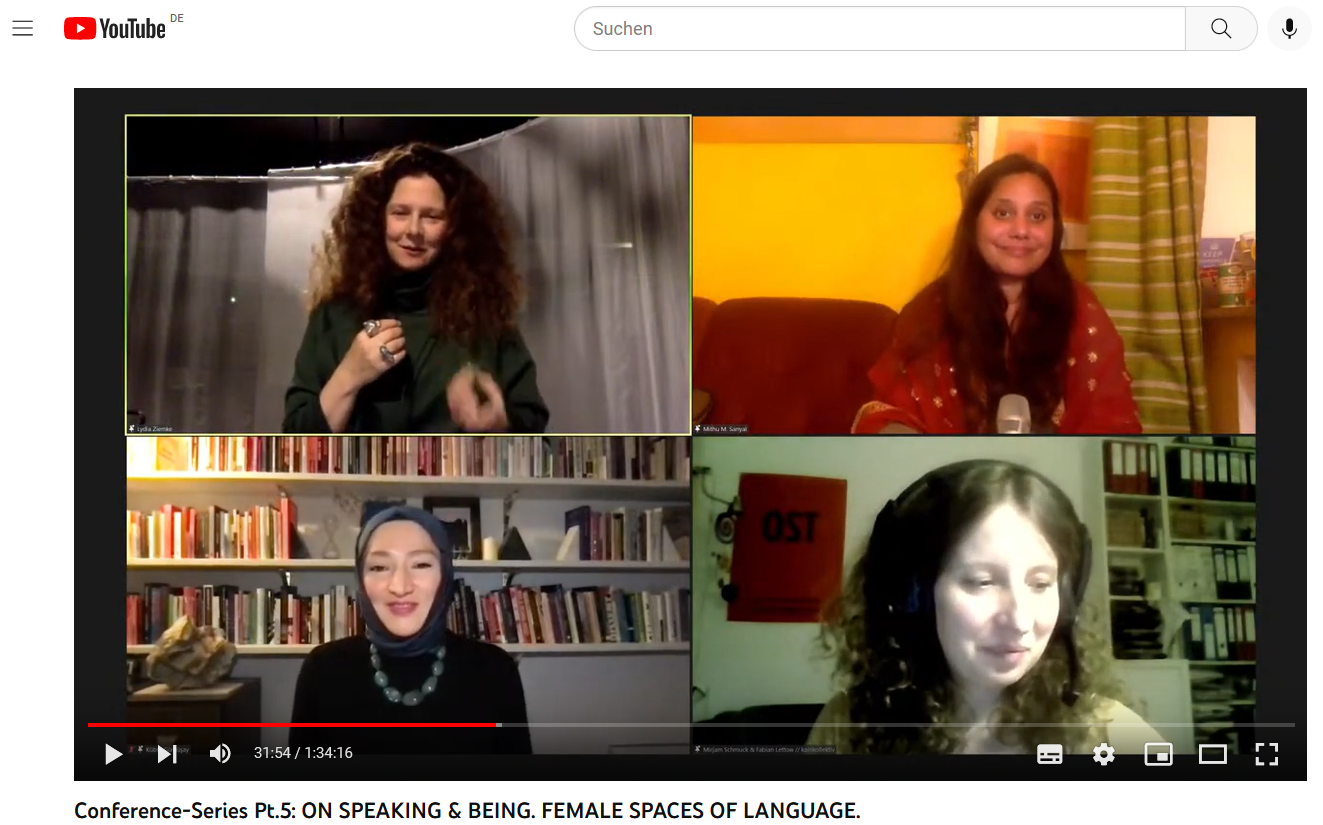
TRANSLATION IN POLISH: Here you can find the complete recording of the Online Conference Series Part 5 with the title: ON SPEAKING & BEING. FEMALE SPACES OF LANGUAGE Speakers: Mithu Sanyal, Kübra Gümüşay Moderation: Mirjam Schmuck (kainkollektiv) & Lydia Ziemke (suite42) hosted by: kainkollektiv September 2021
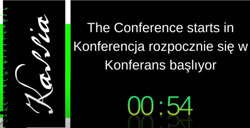
Here you can find the complete recording of the Online Conference Series Part 8 with the title: Searching for Kassia – Protest Poems Yesterday and Today – a (virtual) meeting with Chinese, Georgian, Russian, Ethiopian, Armenian, Kurdish, South Korean/Danish and Turkish women poets Speakers: Lee Cockshott, Christine Yohannes, Tang Siu Wa, Narîn Yukler, Tuğçe Aydin, Egana Djabbarova, Maja Lee Langvad, Karin Karakaşlı Moderation: Meral Akkent & Aylin Vartanyan hosted by: Gender Museum Istanbul October 2021
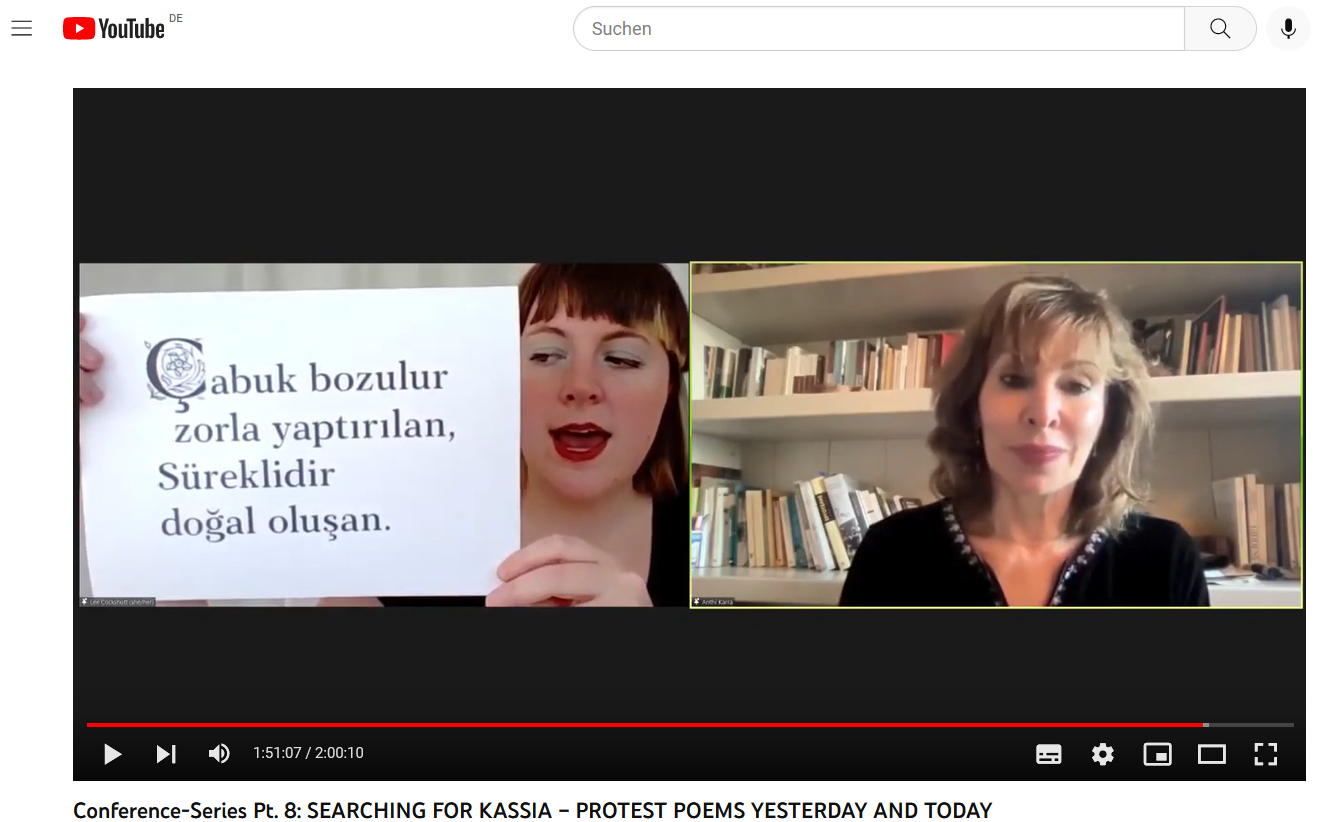
TRANSLATION IN TURKISH Here you can find the complete recording of the Online Conference Series Part 8 with the title: Searching for Kassia – Protest Poems Yesterday and Today – a (virtual) meeting with Chinese, Georgian, Russian, Ethiopian, Armenian, Kurdish, South Korean/Danish and Turkish women poets Speakers: Lee Cockshott, Christine Yohannes, Tang Siu Wa, Narîn Yukler, Tuğçe Aydin, Egana Djabbarova, Maja Lee Langvad, Karin Karakaşlı Moderation: Meral Akkent & Aylin Vartanyan hosted by: Gender Museum Istanbul October 2021
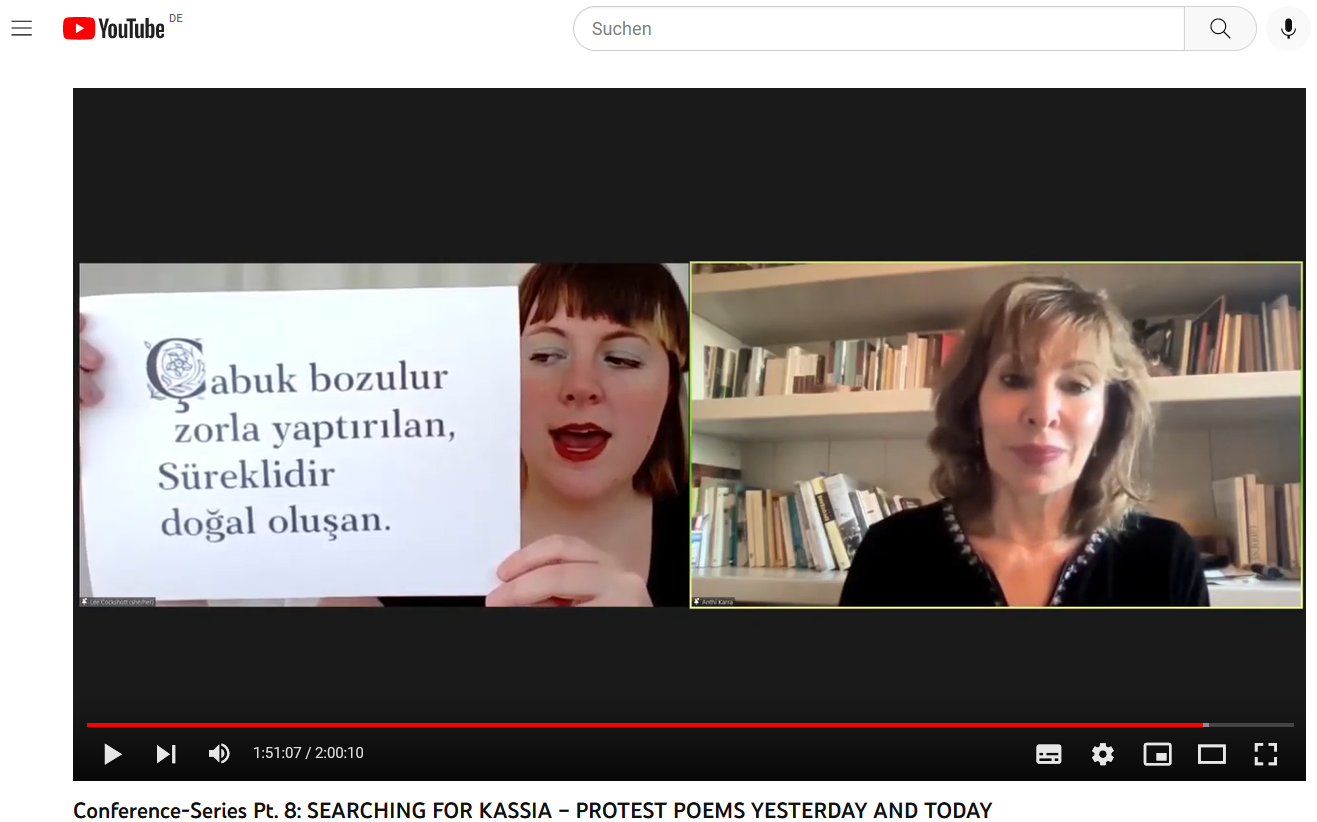
TRANSLATION IN POLISH Here you can find the complete recording of the Online Conference Series Part 8 with the title: Searching for Kassia – Protest Poems Yesterday and Today – a (virtual) meeting with Chinese, Georgian, Russian, Ethiopian, Armenian, Kurdish, South Korean/Danish and Turkish women poets Speakers: Lee Cockshott, Christine Yohannes, Tang Siu Wa, Narîn Yukler, Tuğçe Aydin, Egana Djabbarova, Maja Lee Langvad, Karin Karakaşlı Moderation: Meral Akkent & Aylin Vartanyan hosted by: Gender Museum Istanbul October 2021

Agata: Jaką rolę odgrywa feminizm w twoim życiu codziennym? Iza: Dobra, spróbuję nagrać trochę moich przemyśleń o feminizmie codziennym. Kiedy myślę o feminizmie, to nie jest dla mnie oczywista tożsamość, dlatego że bardzo wcześnie zostałam weganką, bardzo wcześnie miałam antykapitalistyczne podejście do spraw politycznych, ale jakoś nigdy w wieku dorastania nie zetknęłam się z feminizmem. Co jest ciekawe, bo ja też uległam stereotypom na temat feminizmu. Bardzo dobrze odnajduję się w męskim gronie, zawsze trzymałam się z chłopakami i zawsze się dobrze z nimi dogadywałam, więc feminizm kojarzył mi się z byciem przeciwko facetom. Tak, w wieku nastoletnim nie zetknęłam się z żadnymi takimi treściami (feministycznymi), które by do mnie trafiły. Wychowywałam się w małej miejscowości na Lubelszczyznie i tam, chociaż popularne były ekologiczne tematy, to feminizmu nigdy nie było. A później jakoś naturalnie moje drogi przeplatały się z drogami feministycznymi. Kiedy zaczęłam wspominać pierwsze doświadczenia i myśli o tym, jak się czuję jako kobieta w społeczeństwie, to przypomniało mi się, jak miałam jakieś trzynaście/czternaście lat i przeczytałam newsa o nastolatce, która była zmuszona sądownie do urodzenia dziecka. To była dwunastolatka i wtedy to mnie totalnie uderzyło, bo mając te trzynaście/czternaście lat, zupełnie sobie nie wyobrażałam, jak mogłabym mieć dziecko. Ten brak dostępności do antykoncepcji, do aborcji, do wiedzy o aborcji, ten kompromis aborcyjny i tak dalej, to wszystko mnie napawało ogromnym przerażeniem i mam wrażenie, że ten strach towarzyszył mi przez dużą część życia, w różnych sytuacjach. I to jest to, dlaczego jestem feministką, dlaczego jestem feministką codziennie. Głównie dlatego, że często się boję różnych sytuacji i opresji systemu. Opresji ze względu na moją płeć. Jestem feministką dlatego, żeby się nie bać i żeby walczyć o te prawa dla siebie i dla innych. No i myślę sobie też, że jestem w życiu codziennym feministką, bo otacza mnie mnóstwo zajebistych lasek i bardzo mocnych osób i to jakoś mnie niesie. Agata: What role does feminism play in your everyday life? / Jaką rolę odgrywa feminizm w twoim życiu codziennym?

Zuza: Jak praktykujesz feminizm w relacjach rodzinnych? Monika: Staram się dbać o komunikację, co jest trudne, bo każdy i każda potrzebuje trochę innego rodzaju wypowiedzi, by dobrze zrozumieć, co chcę jej powiedzieć. Do tego potrzebny jest czas. Jego mam mało, ale bardzo dbam o organizowanie wspólnych chwil. Pomagają w tym wspólne rytuały, które organizują codzienne bycie razem. Ale też rozmowy o tym, czego potrzebujemy, co wymaga zmiany. Bardzo się staram myśleć o tym, jak wyrażam emocje, bo im się jest bliżej, tym więcej sobie można zrobić krzywdy. Wspólnie podejmujemy decyzje o tym, co wspólne. To wszystko, co tu piszę (i to wszystko, o czym nie zdążyłam napisać), to najtrudniejsza codzienna praktyka życiowa, jaką mam/znam.

Dominika: Co to znaczy dbać o siebie nawzajem w relacji? Żegluga: Wsłuchiwać się w siebie Dawać przestrzeń, głaskać i przytulać kiedy potrzeba Robić kawę i pyszne jedzenie Otulać kocem i ocieplać termoforem Być siostrą i wiedźmą Zabierać na przejażdżkę jednorożcem Być

Marta: What does being a feminist person mean to you? / Co dla Ciebie znaczy bycie osobą feministyczną? Łucja: Bycie osobą feministyczną znaczy dla mnie przede wszystkim bycie… A to znaczy bycie dla siebie i innych troskliwą, uważną, sprawiedliwą, znającą swoje potrzeby i granice. Bycie odważną i pozwalającą sobie na odczuwanie strachu. Bycie waleczną i dającą sobie możliwość bycia słabą lub osłabioną. Bycie osobą feministyczną pozwala być w relacjach, które są dla mnie dobre i tworzenie relacji, które mogą być dobre dla innych.

Róż: What actions/practices are most valuable for building a feminist tomorrow? / Jakie działania/praktyki są najcenniejsze do budowania feministycznego jutra? Ania: Trudno mi odpowiedzieć na to pytanie, bo nie ma praktyk, które zadziałają w każdych okolicznościach. Są za to takie praktyki, które mogą mieć wielką moc w określonym miejscu, czasie, dla konkretnych grup i osób (ludzkich i nie-ludzkich). Dziś wieczorem jestem wykończona i wydaje mi się, że podczas KASSI najbliżej feminizmu przyszłości znalazłam się wtedy, kiedy starałyśmy się wspólnie wypracować strategie odpoczywania i odczuwania przyjemności. Wciąż nie umiem tego robić, czuję się winna, kiedy odpoczywam, a moja prekarna sytuacja najczęściej na to nie pozwala. Może właśnie dlatego myślę, że opieka – nad sobą i innymi – jest węzłową kwestią dla feminizmu przyszłości.

Kasia S.: What is rest for you? / Co jest dla Ciebie odpoczynkiem? Agata: Odpoczywam, kiedy chodzę. A chodzę dużo, najczęściej w jednostajnym rytmie. Chodzę i wsłuchuję się w przestrzeń, odbieram ją, odczuwam i oddaję jej swój czas. Kończę, kiedy chcę, nie kiedy muszę. A wszystko to robię, pijąc kawę. Biorę łyk za łykiem, czuję, jak każdy łyk płynie przez moje gardło do żołądka. Wyobrażam sobie wtedy, że kawa płynie w moich żyłach – to jest ten moment, kiedy czuję, że się odprężam.

Iza: What pleasures did our collaboration give you? / Jakie przyjemności dała Ci nasza współpraca? Zuza: Ostatnio na swój własny użytek zaczęłam dokonywać rozróżnienia na te rzeczy, które dają mi przyjemność i te, które dają mi satysfakcję, chociaż satysfakcja też jest związana przyjemnością, więc to nie jest takie proste. Przyjemność jest dla mnie bardzo specyficznym trybem doświadczania rzeczywistości i w naszej pracy było jej dla mnie bardzo dużo i była oderwana od tych momentów, które powinny przynosić satysfakcję, na przykład kiedy udawało nam się coś zrobić albo kiedy jakieś większe etapy tego projektu były zamknięte i już można było o nich powiedzieć, że skończyły się dobrze, lub nawet, że zakończyły się sukcesem (chociaż to słowo też jest wywrotne). Bardzo dużo przyjemności sprawiało mi bycie z wami i te momenty, w których trochę się wymykałyśmy pracy i temu co było założone na dane spotkanie i zaczynałyśmy rozmawiać o tym jak możemy komuś pomóc albo rozmawiać o sprawach, które były jakoś dla nas ważne w tym czasie, w którym razem przebywałyśmy. Wydaje mi się, że to był taki rodzaj przyjacielskiego współbycia, a przyjaźnie są dla mnie najważniejszymi relacjami, jakie istnieją, i w kontekście feministycznych działań są absolutnie kluczowe.

Monika: Jeśli chcesz się tym podzielić, to chciałabym zapytać, czy było coś, co sprawiało ci trudność w czasie naszej współpracy i jak sobie z tym radziłaś/radziłyśmy? A jeśli wolisz ogólniej: jakie masz metody radzenia sobie z trudnościami pojawiającymi się w czasie współpracy? Dominika: Na samym początku projektu, kiedy wszystkie wdrażałyśmy się w zagadnienia, które będziemy poruszać, sposób pracy, rodzaj współpracy z kainkolektiv itd., były momenty, w których czułam obawę o swoje kompetencje – że wiem za mało, że nie odnajdę się w poruszanych treściach. Po jednej z rozmów z Anią i Zuzą te obawy minęły. Potem miewałam trudności w rozumieniu wszystkiego i nadążaniu za wszystkim, nad czym pracujemy. Wynikało to w dużej mierze z moich zajętości i trudności w życiu, jakich doświadczałam w tamtym czasie. Jeżeli czegoś nie wiedziałam, kontaktowałam się z jedną lub dwoma osobami z projektu, aby dopytać, przegadać, ustalić rzeczy. To bardzo pomagało. Pomagały również spotkania w mniejszych zespołach (np. przy okazji pracy nad spotkaniem o edukacji feministycznej). Moje wątpliwości, trudności pojawiały się później coraz rzadziej, bo lepiej się poznawałyśmy. Mi samej udało się uwierzyć, że moja obecność jest wartością w grupie niezwykle ciekawych, pięknych, dobrych i wartościowych osób. Jestem niesamowicie wdzięczna za to, że Was spotkałam, bo uważam, że rodzaj współpracy, którego doświadczyłysmy, pozwolił mi poczuć się pewniej (to takie moje prywatne podziękowanie). To chyba siła siostrzeństwa.

Żegluga: Co zostawisz sobie z KASSI i co przekażesz innym? Marta: Z KASSII zostawię sobie przyjaźnie i więzi i... zostawię sobie też grono ekspertek, które tutaj poznałam, i z którymi mogę współpracować, i które mogę też poprosić o wsparcie. Ale z KASSII biorę też umiejętność proszenia o wsparcie, której nie miałam wcześniej, i dużo odwagi. Odwagi w dzieleniu się swoimi praktykami i propozycjami, ale też w pytaniu o praktyki i propozycje innych osób. Czasem mi się wydawało, że nie mogę pytać o niektóre rzeczy, a teraz wydaje mi się, że o wiele rzeczy mogę pytać i że wiele osób też chce wspierać swoją wiedzą i swoimi praktykami. Ale nie mamy takiej szansy, bo ja nie pytam albo inne osoby nie pytają. Myślę, że to, co chcę przekazywać innym i co już zaczęłam robić, to kolejny sposób na rozpychanie struktur i systemu, w jakim funkcjonujemy w sztuce, w nauce, w teatrze. Bardzo dużo się tutaj nauczyłam i to wszystko mogę przekładać, używać. Dostałam bardzo dużo narzędzi. Mogę też zapraszać osoby do tego, żeby praktyka, którą podzieliły się w KASSII, mogła być też praktyką, którą będą się dzielić dalej, z innymi osobami, z którymi ja będę się stykać w pracy. I wtedy będziemy się dzielić razem. Ale chyba też wróciło do mnie coś, o czym trochę zapomniałam – niezależnie od tego, na jakim jestem etapie swojej drogi, mogę uczyć się i dzielić się z innymi osobami, niezależnie od tego, gdzie one są. Czasem łatwo było mi się zagubić w tym, że mając trzydzieści-kilka lat powinnam być już gdzieś, gdzie aktualnie nie jestem. Ale dzięki KASSII myślę dużo też o tym, że jestem tu, gdzie jestem i właśnie tym mogę się dzielić z innymi osobami. Tak. I biorę też dużo cierpliwości w ustalaniu terminów spotkań w dużych grupach. DODATEK TEKSTOWY: Choć w sumie mogłabym wyliczać cały dzień, używając różnych języków i dyskursów, bo w każdym z nich KASSIA pozostawia mi coś innego. I jeszcze jedno: słowo “afekty”. Czy KASSIA od tyłu nie czyta się AFEKTY?

Łucja: Czy kiedy będziesz budować/tworzyć relacje – prywatne, zawodowe, z krajobrazem, przyrodą, każdą/każdym, Inną/Innym – będzie w nich coś (uczucie, praktyka, spojrzenie, słuchanie, dawanie odpowiedzi), czego doświadczyłaś w procesie naszej pracy w ramach KASSII? Kasia S.: Z naszej współpracy została mi pewna miękkość i delikatność w oczekiwaniach wobec osób z którymi współpracuje i efektu końcowego. To, co do tej pory obserwowałam w idealistycznych rozmowach i tekstach w praktykach choreograficznych (czy szerzej artystycznych), że liczy się proces, a nie produkt, przeniknęło do mojej codzienności zarówno w pracy zawodowej, jak i w relacjach prywatnych. Staram się bardziej słuchać, rozumieć różne perspektywy i potrzeby, różne czasowości, podejścia, granice, wytrzymałości. Być bardziej wyrozumiała dla innych i dla siebie, dawać sobie i innym więcej czasu i przestrzeni.
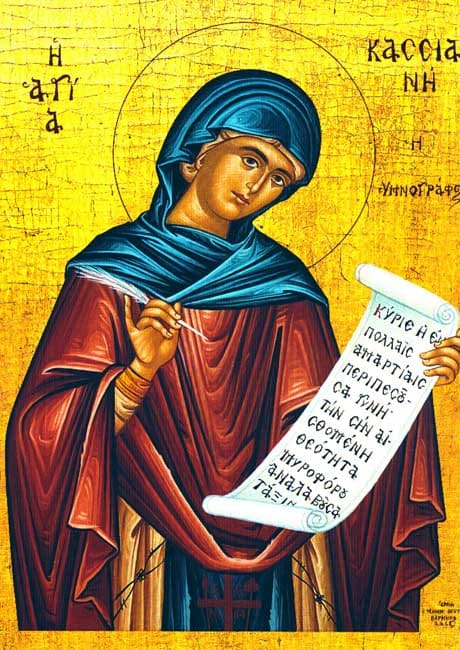
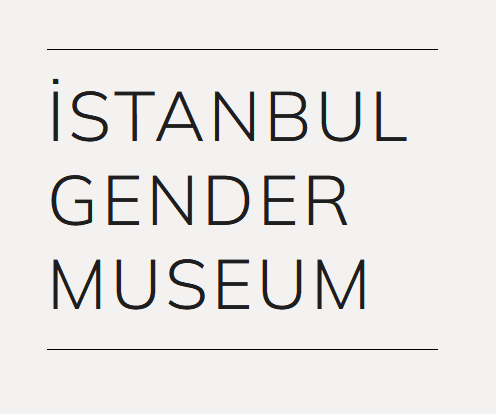

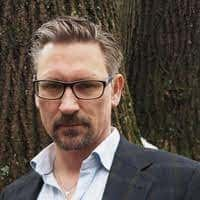
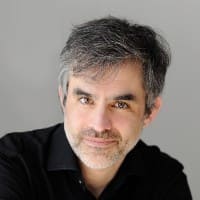
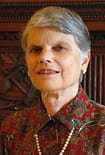
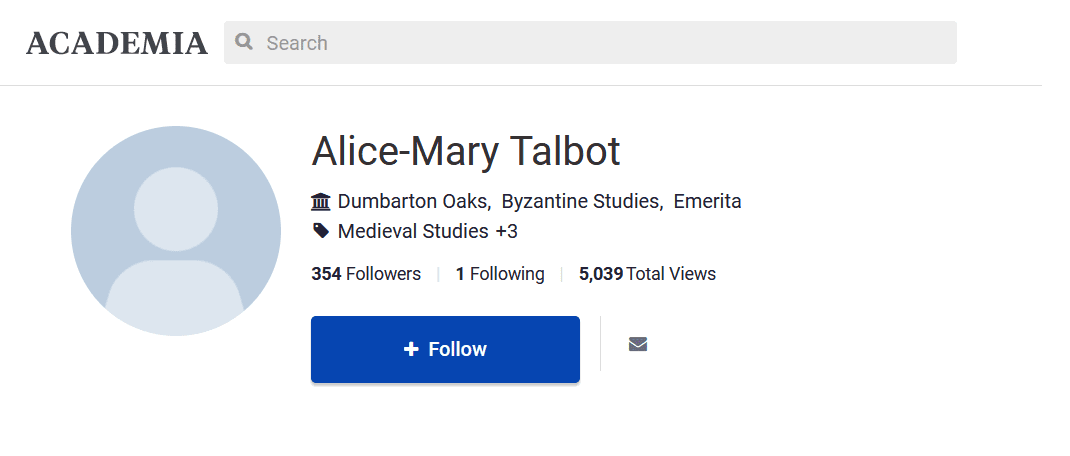
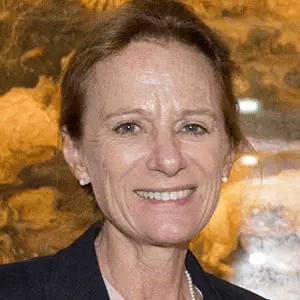
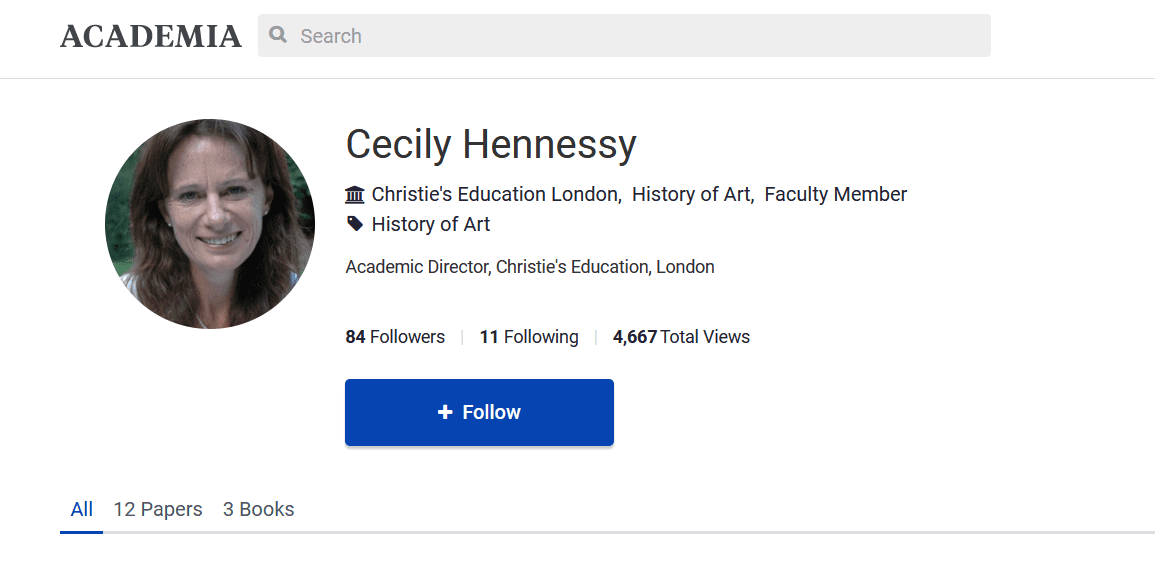
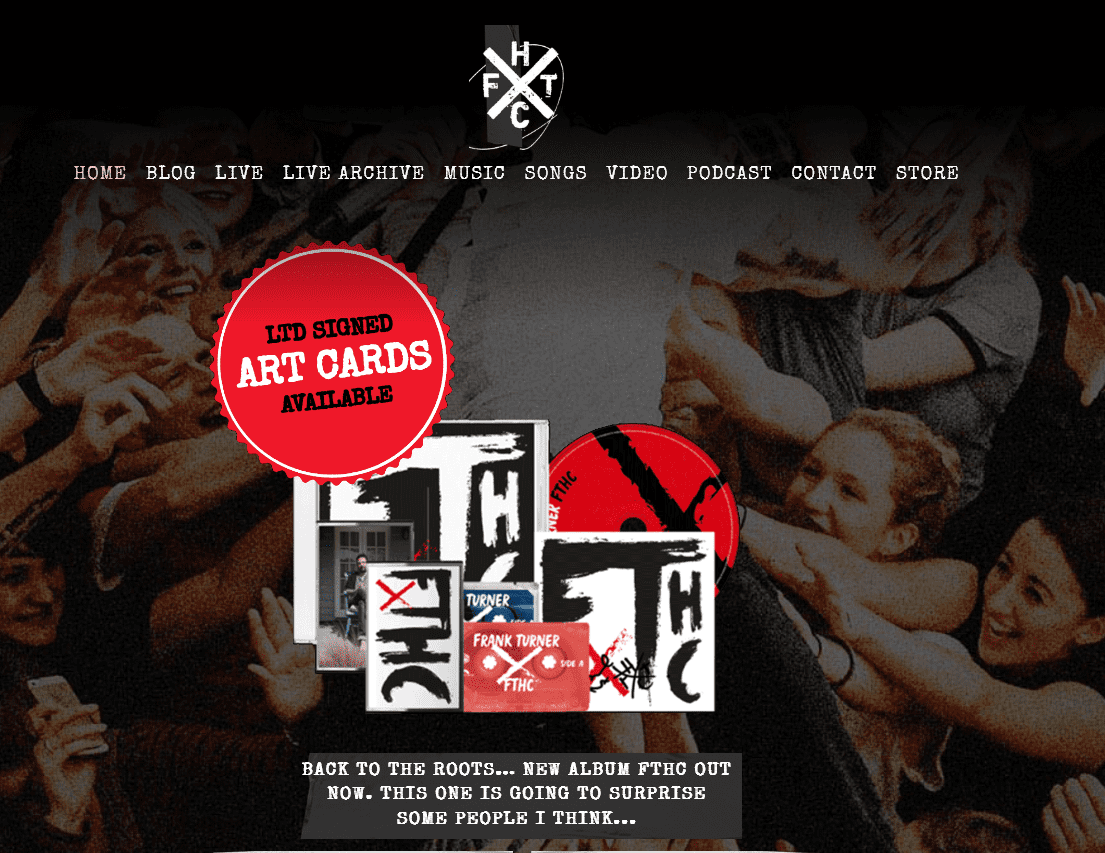
Rumeysa Camdereli.jpg)
